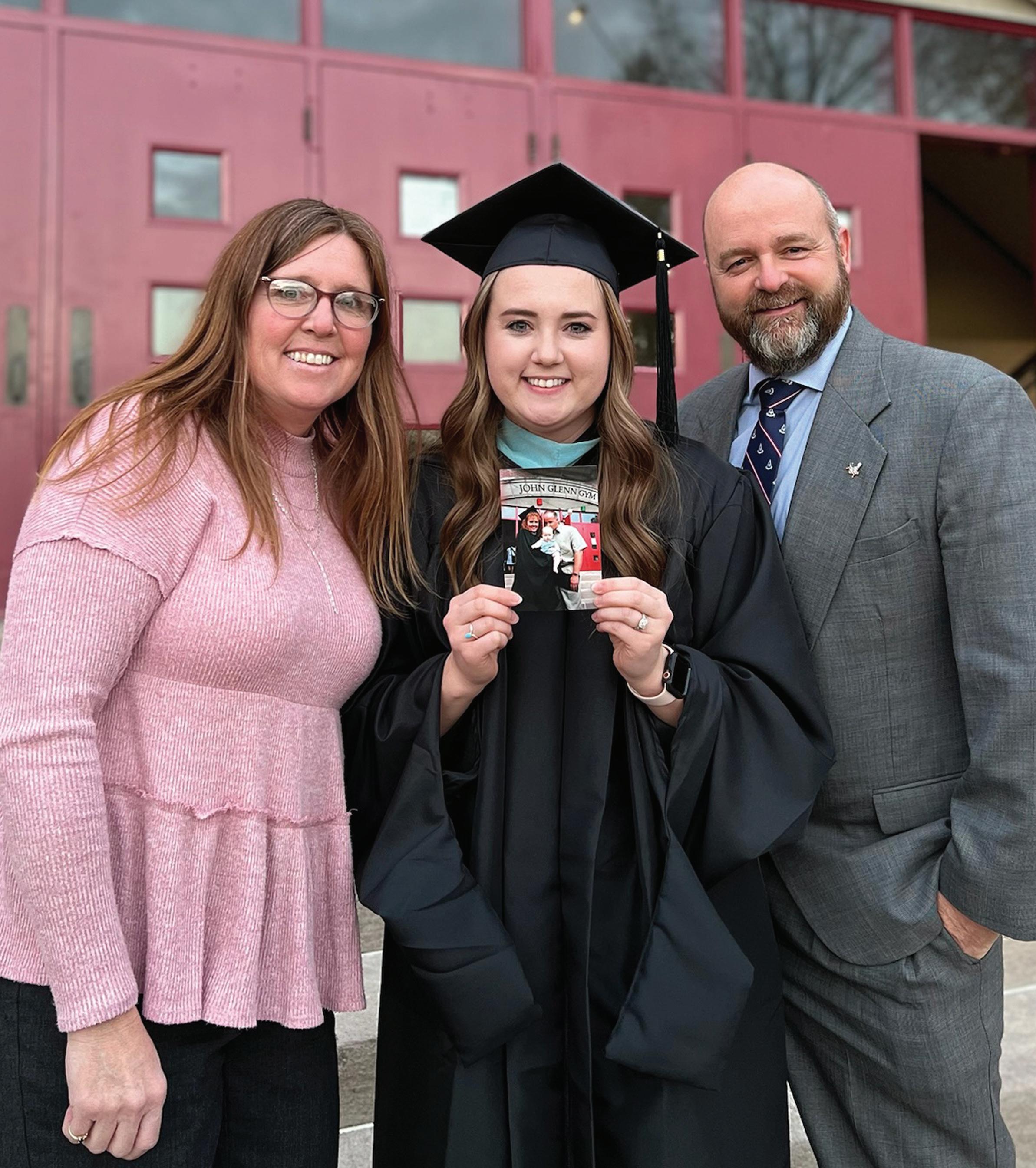
Long Magenta Line Spans Generations See page 7
UPDATE SUMMER 2024
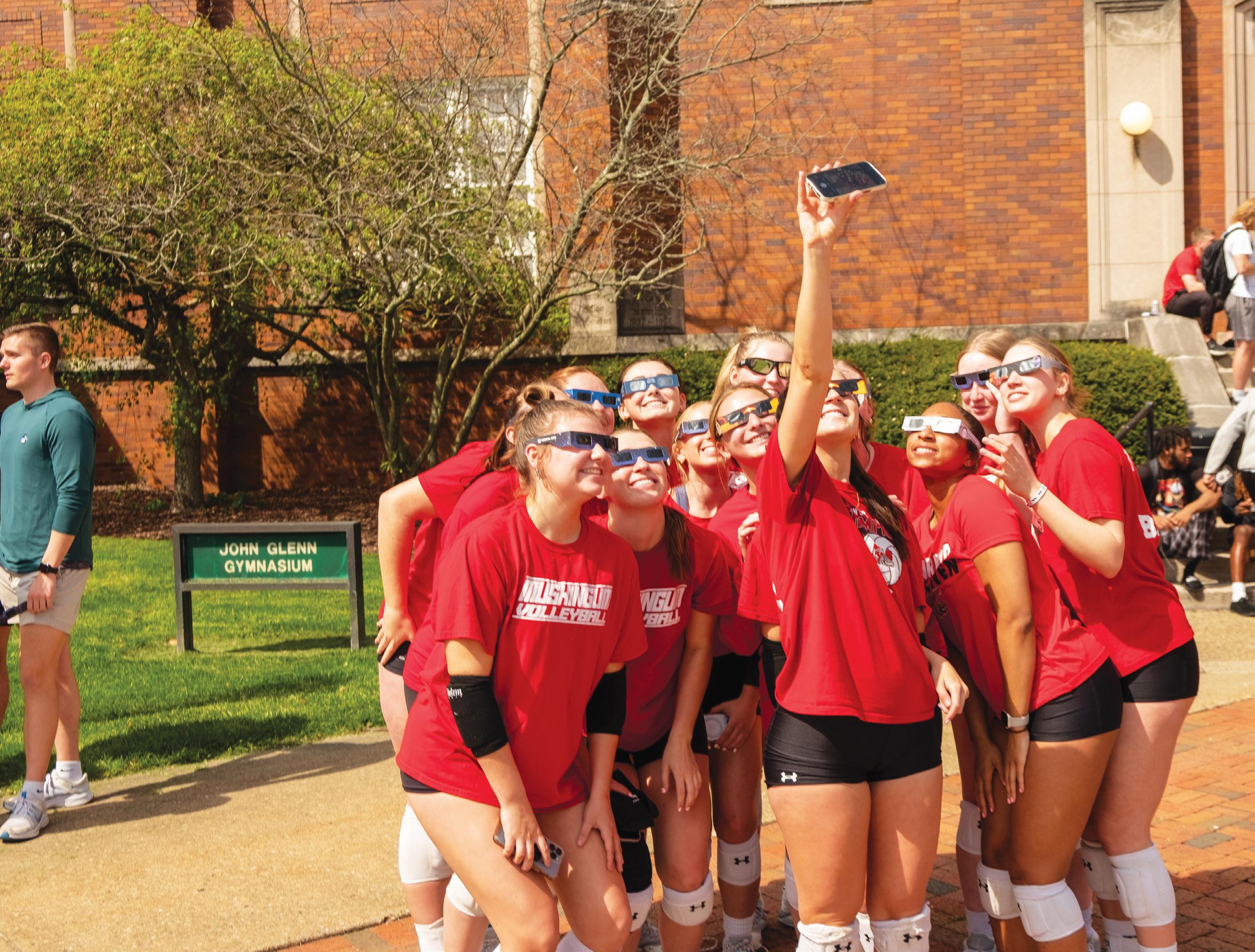
Editor: Michelle Shaver
Contributors and Photography: Joseph Brown, Tom Caudill, Jim Dooley, Annette Giovengo, Brianna Kasinecz, Paul Kotheimer, Emilee Mulhall, Michelle Shaver
Online Archives: muskingum.edu/updatemag
Comments and Questions: theupdate@muskingum.edu (740)826-8134
Address Changes: alumni@muskingum.edu (740)826-8131
3 12 15 18 4 21 22 23 10 7 © 2024 Muskingum University Muskingum University does not discriminate in its employment or educational programs or activities. www.muskingum.edu/non-discrimination-statement
2
2024
the
Gallery
December 2024 Graduate
UPDATE
OF CONTENTS
Muskingum Volleyball team enjoying the solar eclipse on the Quad
@Muskingumalumni Class of
Stats The Long Magenta Line Gets Longer Letter from the President From
Lake to the
Dr. Gladys McGarey: The Well-Lived Life Athletics - By the Numbers Minute with a Muskingum Society Member Create a Life More Abundant
- Hesham Khedr A Muskie's Journey from Computer Science to Nursing Making Space for the Future Leading With Emotional Intelligence
TABLE
From the President's Desk
Dear Muskingum Alumni and Friends,
As I walked into the Steele Center on May 4 for our spring commencement, the energy was astounding. I looked around and saw generations of families ready to celebrate their graduates. It was a delightful culmination of a unique educational experience for all these graduates.
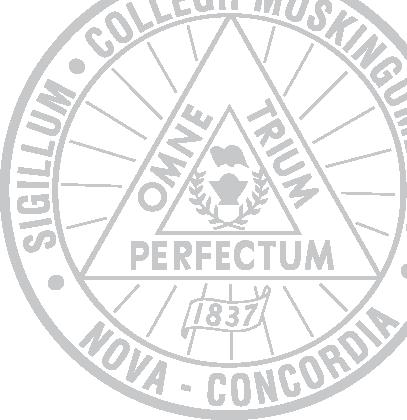
Many of the undergraduate students at this commencement did not have a traditional high school graduation due to COVID. The first two years of their college experience included face masks, social distancing, limited activities, and constant COVID testing. To many of us the pandemic is fading into the past but for this graduating class, it shaped the beginning of their college career
However, over their time at Muskingum, these students acquired deep and broad knowledge and skills, developed strong friendships, learned how to perform, lead and serve, and emerged full of joy and energy. We also celebrated with our graduate students who demonstrated resilience in their own ways.
On Commencement Saturday, they all donned their caps and gowns and proudly walked across the stage, and we were honored to be able to share in that celebration. This graduating class now joins the Long Magenta Line, united by their shared experience with the generations who have crossed the platform before them.
In recognition of the generations of alumni who are making a difference in their communities and at Muskingum, this issue of Muskingum Update features alumni stories ranging over nine decades. They are following their dreams, demonstrating an innovative spirit, and making a tremendous impact on others.
As you read their stories, you will also learn about some of the opportunities to become involved with Muskingum today. I hope you will be inspired to join us as we ensure that students of all ages thrive at Muskingum University.
President Susan S. Hasseler
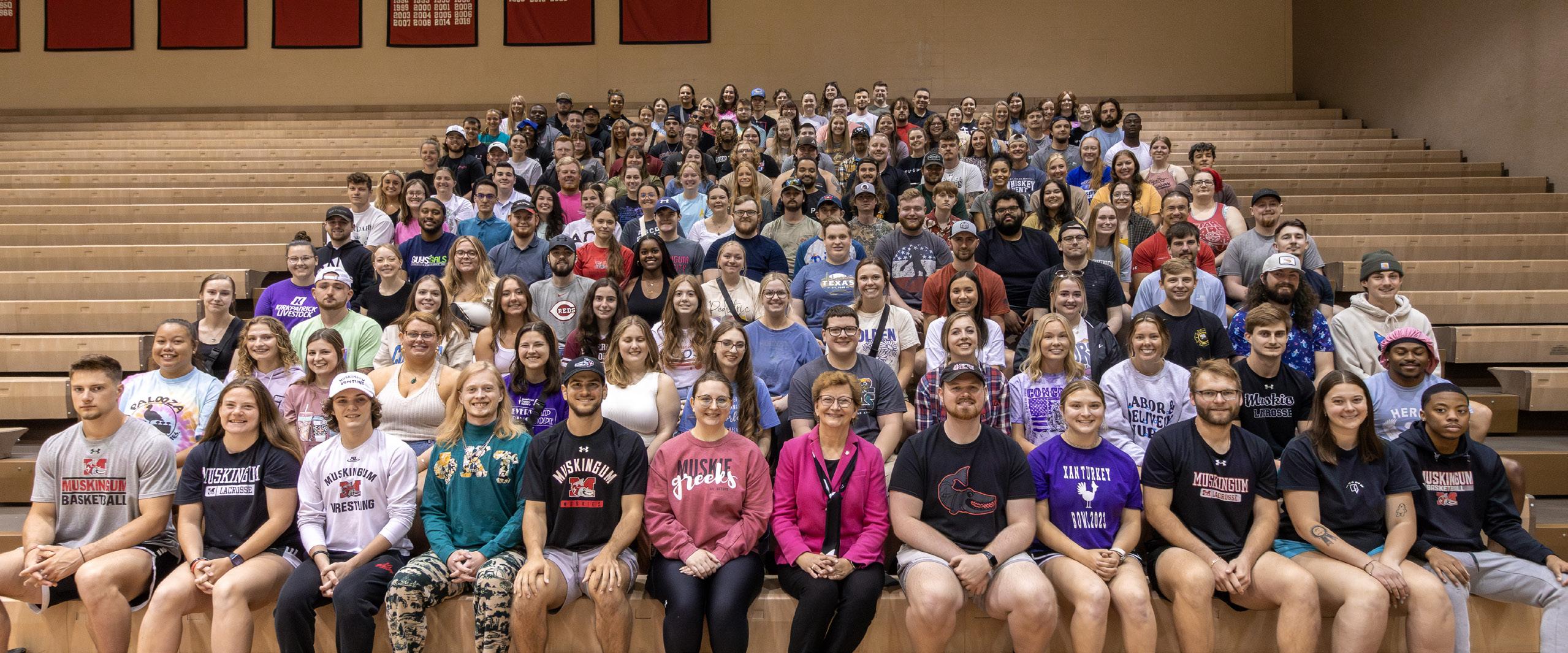
3 President Hasseler with 2024 Graduates
Class of 2024 GRADUATE students
UNDERGRADUATE Students
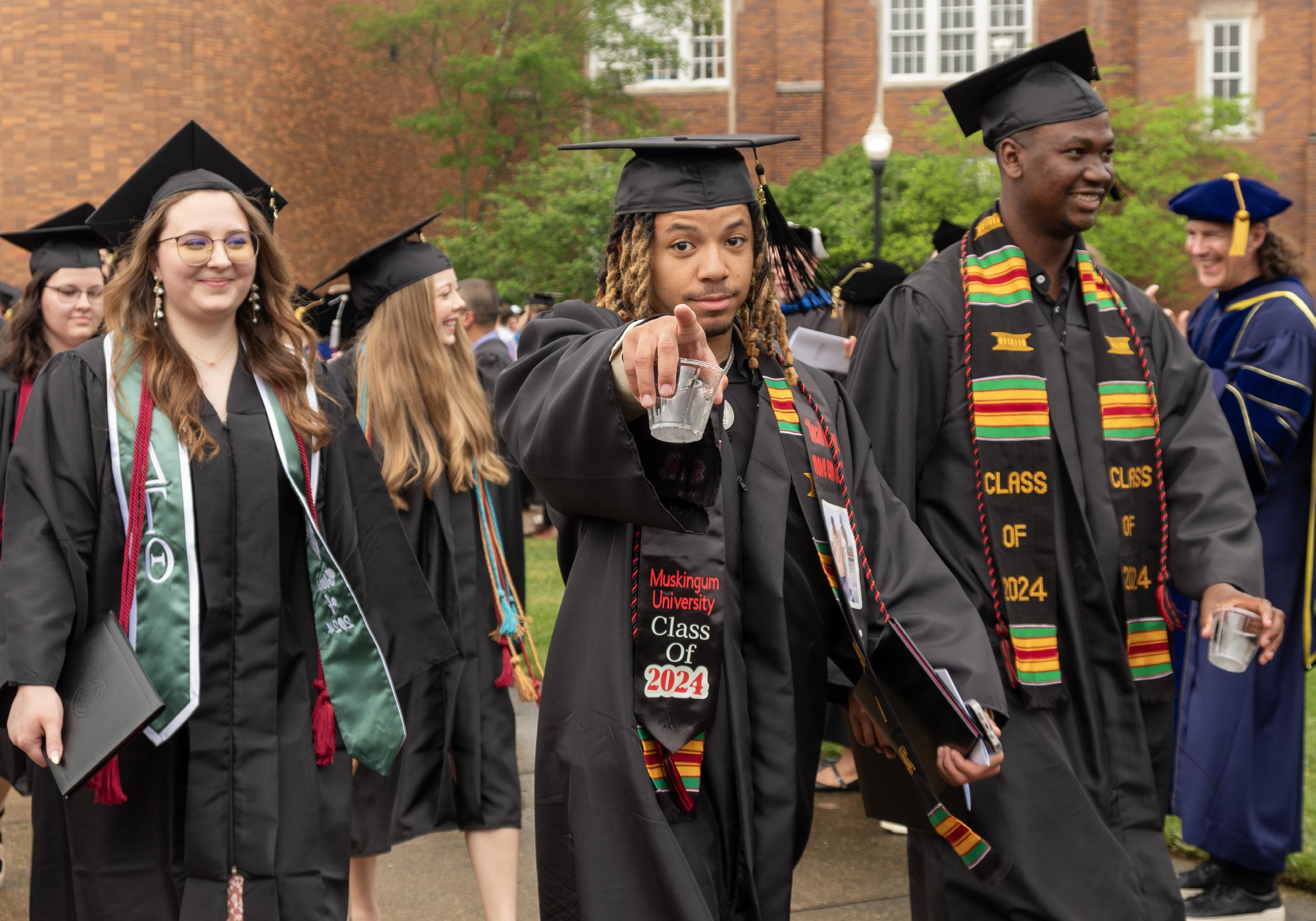
4
TOTAL GRADS CUm Laude Magna Cum Laude Summa cum Laude States represented Athletes GREEKS # of HONOR STUDENTS 267 35 49 37 14 TOTAL GRADS States represented 97 14 137 106
A Muskie's Journey from Computer Science to Nursing
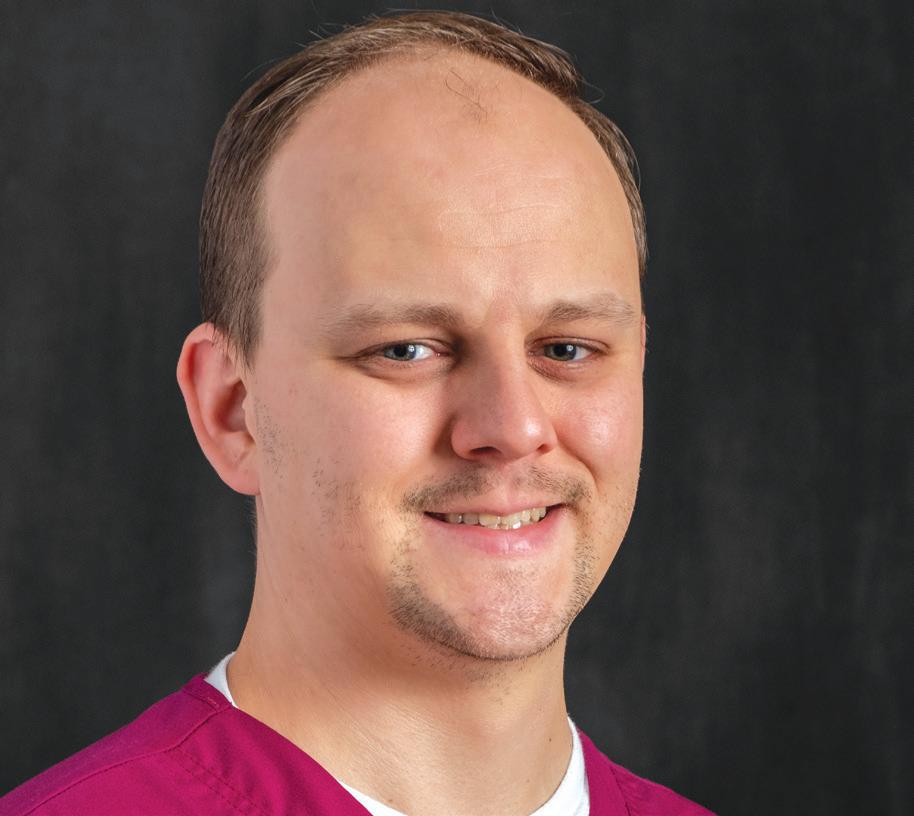
“You don’t always have a childhood dream,” reflects Andrew Marczewski ’17 ’23.


“Sometimes you have a dream later in life and you can go back and pursue it. Muskingum’s Accelerated Bachelor of Science in Nursing Program enabled me to do that.
“When I first attended Muskingum, I majored in computer science,” Andrew recalls. “I graduated in December 2017, and worked as a software developer for Wiley Companies, a chemical manufacturer in Coshocton, Ohio for almost four years.
“Even though I have several family members who are nurses, I had never considered becoming one myself. In March 2020, however, I found myself filling a caregiver role for my older sister who had breast cancer. During the following years before she lost her battle in February 2022, I had a series of experiences that led me to change my perspective. Spending time in medical settings I grew to more deeply appreciate the level of competency, intelligence, and level-headedness many nurses exhibited in their practice. I also began to reflect on the importance of showing mercy and compassion on those who are suffering.
“As a Muskingum alum, I knew the University’s nursing program was highly regarded. When I discovered they had an accelerated track in which I could finish my degree in 15 months, I reached out through the website and very quickly received a phone call from Nursing Professor Joe Shaeffer. He was incredibly helpful in laying out everything I needed to do to enroll and how to complete the required prerequisites for the program.”







Andrew started taking prerequisite courses in April 2022, began the program at Muskingum in August 2022, and graduated in December 2023.




“One great thing about Muskingum is the classroom culture. The professors have a tremendous commitment to our success. They push us to do well but will always take the time to help when needed. The ABSN is a very intense and challenging program and you need to put in the work to learn a lot in a short period of time, but it was very rewarding and definitely worth the effort. The program prepared me to be successful in what I am doing now.
“The experience of earning my first Muskingum undergraduate degree was helpful because I knew what was expected of me. I’m very happy that I made the career switch to nursing, but I haven’t counted out also using my computer science degree at some point in the future. There are many opportunities to apply that knowledge to healthcare technology and research, and I think it’s important to remain open to exploring new possibilities throughout your career.”
After earning his BSN degree, Andrew accepted a job with Ohio State University Hospital, the flagship patient care facility of The Ohio State University Wexner Medical Center.



5
“I work in one of the hospital’s Progressive Care Units with patients who require a level of care in between intensive care and a regular hospital setting. My Muskingum education prepared me well for my new career, where I make a difference in others’ lives.”
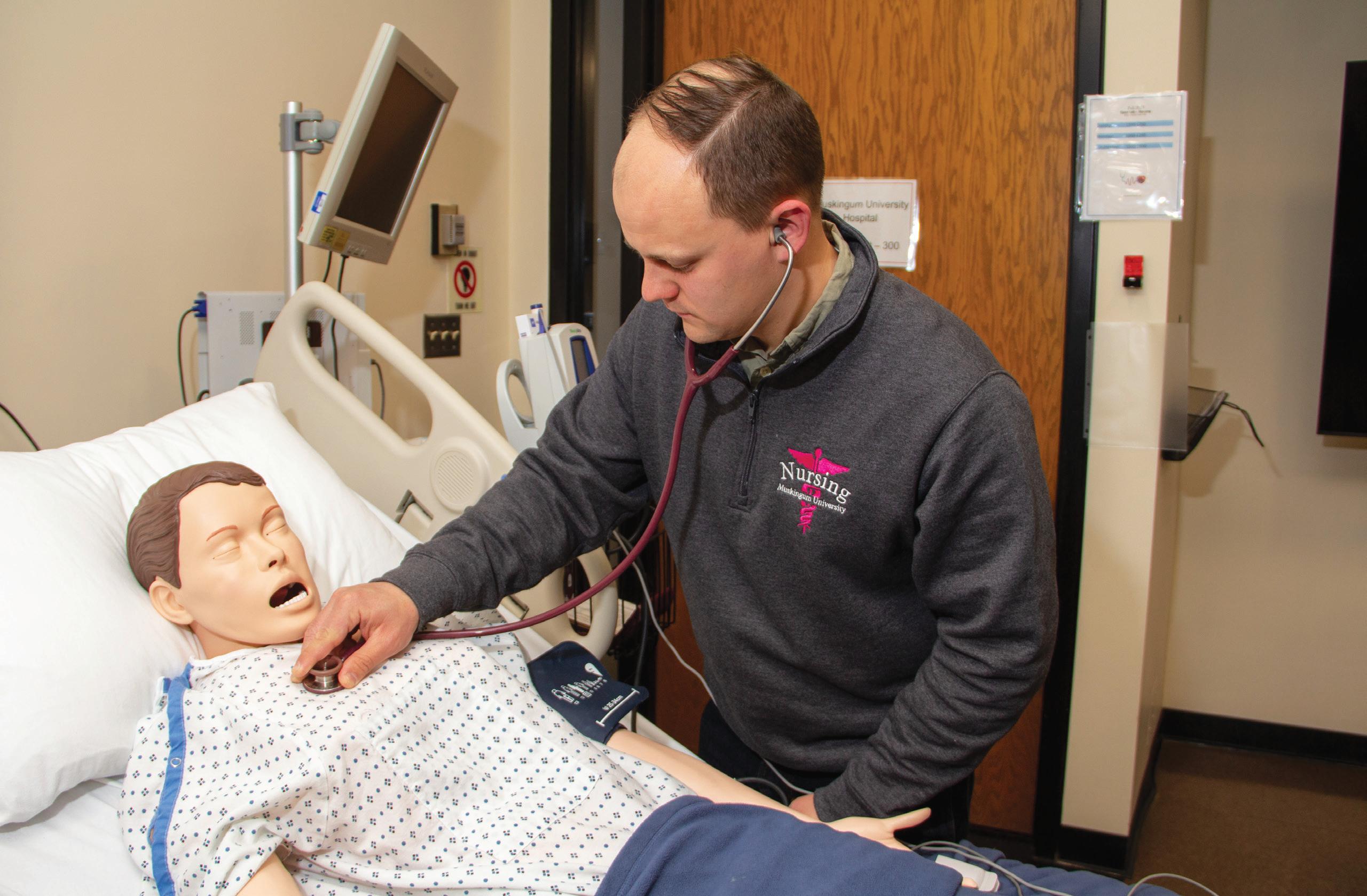
ABSN AT MUSKINGUM ABSN AT MUSKINGUM
Muskingum’s ABSN program is a second bachelor’s degree program designed for individuals who hold a bachelor’s degree in any field and wish to earn a Bachelor of Science in Nursing degree.
Through a combination of online and face-to-face oncampus classes, students complete the program and earn their BSN degree in just 15 months.
Assistant Professor of Nursing Macey Carson is the Coordinator and Advisor for the ABSN Program. “Our program offers an amazing opportunity for students to transition into a rewarding career. At the same time, we are helping to address the critical need for nurses in our regional workforce,” she said. “The job market for nurses is in high demand, with employers offering strong salaries and flexibility in location, schedules, and work environments.
“Our ABSN program is known for building critical thinking and technical skills through hands-on, evidence-based practice in our state-of-the art nursing
laboratory,” she explained. “Classes are taught by experienced and supportive faculty. Small class sizes and personalized advising, academic resources, and mentoring support our students in becoming independent and accomplished learners, setting the stage for their long-term professional success. Students complete their clinical experiences in a variety of different settings, which prepares them to meet employers’ expectations and allows them to explore diverse practice areas.”
ABSN students entering Muskingum beginning in Fall 2024 have the opportunity to receive Choose Ohio First Scholarships, sponsored by the Ohio Department of Higher Education to help support students enrolled in STEM (Science, Technology, Engineering, and Mathematics) fields.
Scan the QR Code to hear from students about the program
For more information, visit www.muskingum.edu/gcs/accelerated-nursing or contact maceyc@muskingum.edu or 740-826-6168.
6
The Long Magenta Line
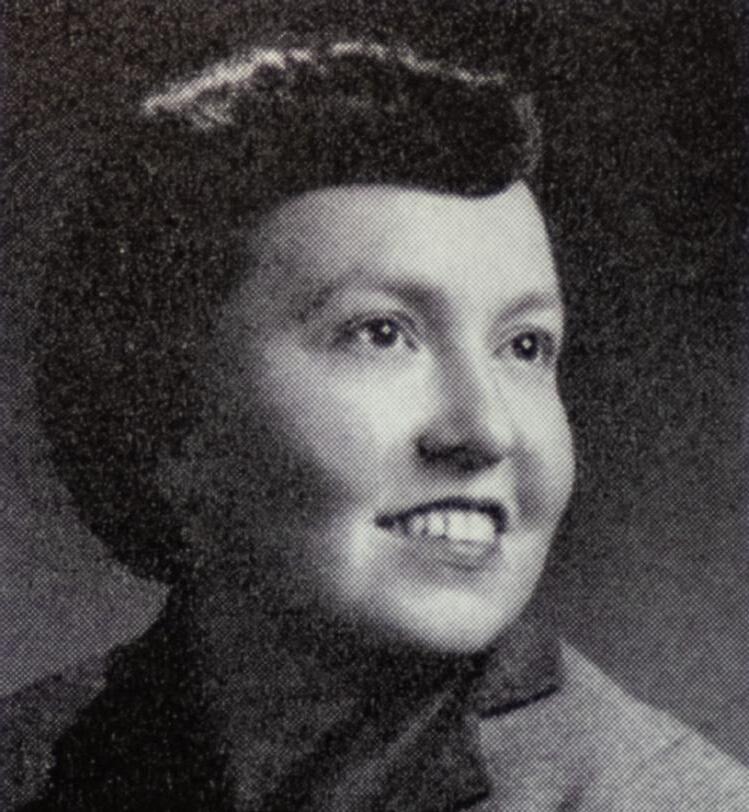
gets Longer
In 1952, Doris George ’55 had no idea the impact The Long Magenta Line would make on her family. At 91-years-old, she can look at her daughter, Christine Dobbins ’93 MAE ’00, and granddaughter, Cassidy Mast ’21 MAE ’23, and feel proud of the legacy she started.
Life-long Guernsey County resident, Doris remembers being encouraged to earn her degree at Muskingum University by her uncle.
“My uncle had been a teacher and when he saw that I wasn’t moving very fast toward college he thought ‘hmm yeah’ so he put his foot down and insisted I go look around over there [Muskingum],” she recalled. “With his encouragement, that’s why I happened to go to Muskingum. It was the place to go.”
Doris decided to study education since she always worked with kids at her church, in the community, and in 4H, and said everything fell into place of becoming a teacher.
Doris remembers her time spent at Brown Chapel, studying in Cambridge and Montgomery Halls, and living in Patton Hall. She joked about her memory of walking the hills on campus like everyone else. She was also a member of a women’s social club called the Athala Club, where she created many friendships.
After graduating in 1955 with her bachelor’s degree in elementary education, Doris began her career as a teacher.
“I thought I would get away from home, so I was encouraged to go to Marion, Ohio. I had some people located around there,” she said. “I went to Marion and was teaching second grade for about five years. Then my mother was ill, and I knew there was no one else at home to take care of her besides my dad.”
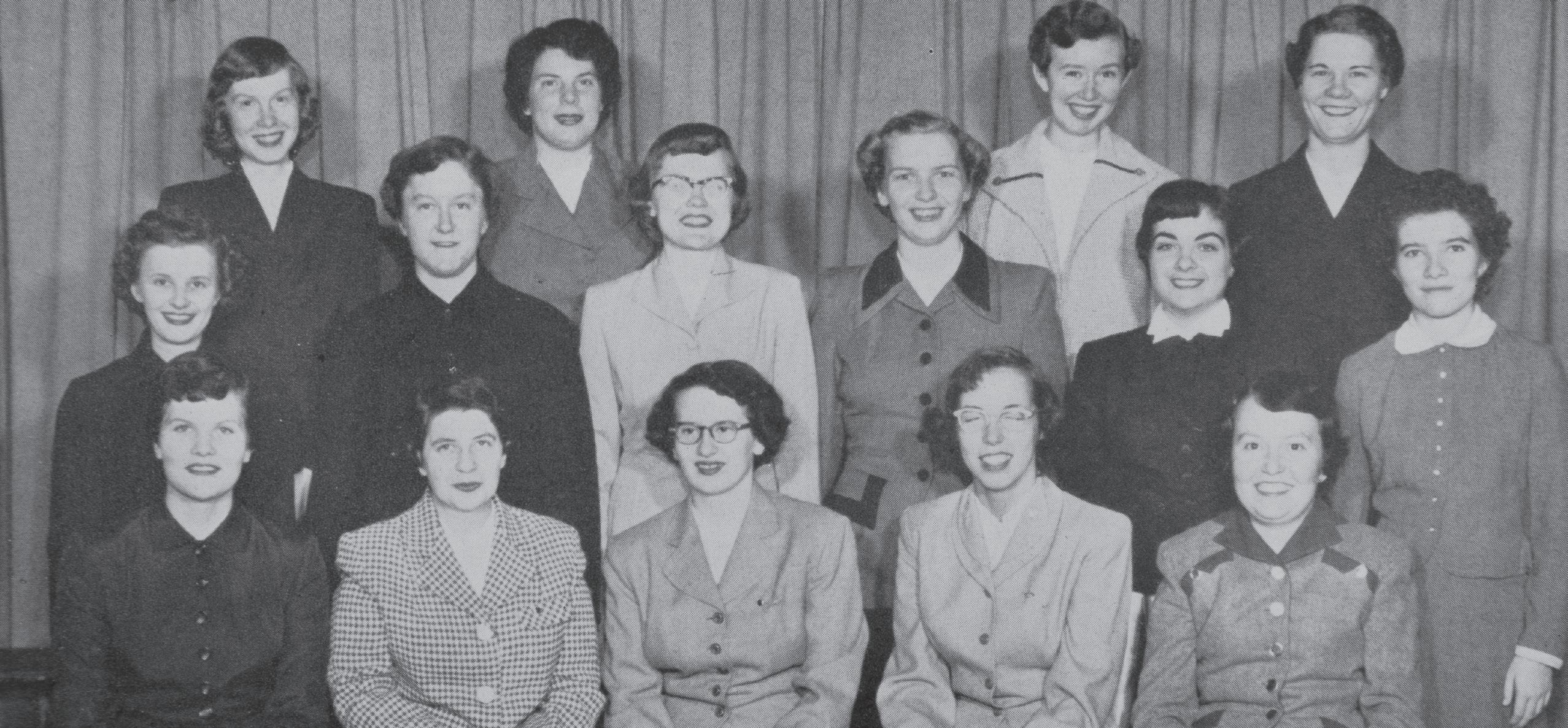
7
Doris left Marion at the end of her fifth year of teaching and returned home to aid her sick mother. Her mother’s condition became worse, so she did not return to teach the following fall. After her mother’s passing, she found herself as a substitute teacher at West Elementary School in Newcomerstown, Ohio.
“They knew about me because we lived around this place. So, I got in as a substitute teacher after Christmas, and I taught there for 10 years. So, I guess I wasn’t too bad,” she joked.
Doris feels that it is an honor to have had her daughter and granddaughter attend Muskingum and is grateful every day to have a college education.
“I’m certainly grateful that someone insisted I go to college,” Doris said. “I probably wouldn’t have gone any place and sat at home all these years.” Fast forward to 1989, Christine Dobbins decided to walk in her mother’s footsteps at Muskingum and study education. She was looking for a college with a good education program and knew that Muskingum had a great reputation.
I started it and I wanted to complete it with Muskingum,” she said. “I was proud that my undergrad was there.”
After graduation Christine started working at the Educational Service Center and tutoring in Cambridge. Four years later she found herself with her first classroom at Indian Valley Local Schools, where she still is today, 27 years later.
Christine shares her love of Muskingum and teaching with her daughter, Cassidy Mast, a recent two-time graduate of Muskingum.
“I am very proud. I was excited when she wanted to go there [Muskingum],” Christine said. “That was her choice. Just so proud of her because it’s something we can share.”
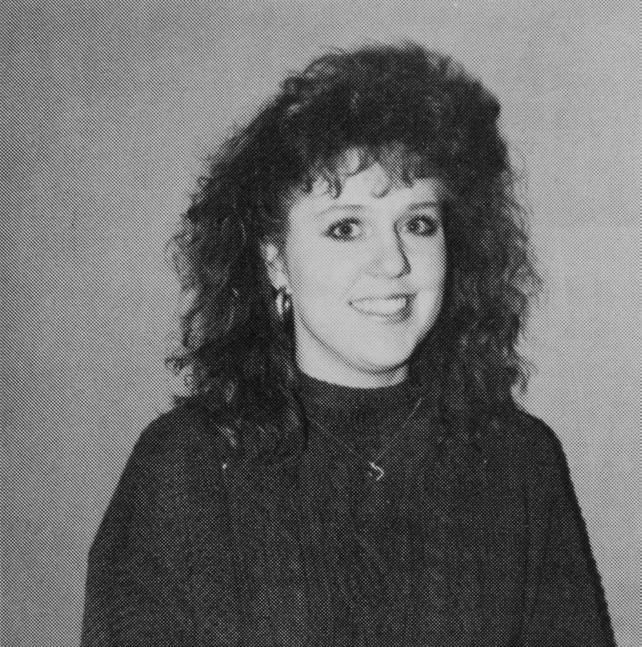
“Both my parents were teachers, so that’s all I knew. I knew that’s what I wanted to do,” said Christine. “I knew Muskingum had a good education program and they were known for education, so, yeah, I was looking for that in a college.”
During her time on campus, Christine can remember walking across the quad and having professors remember her from previous years. Some of her favorite education professors were Steve Kokovich, Linda Morrow, Judy VanVoorhis, and Andrew Frese.
“You could walk across the quad and a professor you had a couple years ago could call you by your name,” she recalled. “I remember that feeling.”
After completing her bachelor’s degree in elementary education, Christine continued her studies at Muskingum and earned her Master of Arts in Education. “It felt like it was the thing to do. I was pleased how
During Cassidy's undergraduate years, she was a member of many clubs and honorary organizations. Not only did she make connections with her peers, but also with her education professors.
“I had really good relationships with Mary Youmans and Linda Rogness,” she said. “They both came to my wedding. They were always there. Anything I needed help with.”
Cassidy knew that Muskingum sets you up for success, so when it was time to pick where she would attend graduate school, the answer was Muskingum with no hesitation.
“Muskingum did a really good job instilling the core values you really need to have to be a good teacher, to have a right moral compass,” said Cassidy. “Little things you don’t think about, they tell you.”
She already knew from a young age that teaching was in her blood and was going to attend Muskingum. What she didn’t know is after she graduated with her bachelor’s and master’s in education, that she would have her own classroom
” ”
right next to her mother at Indian Valley Local Schools as an Intervention Specialist in third and fourth grade.
What started out as a joke of teaching in the same school turned into reality with fun memories being made.
“I ended up getting it [job] and the fact that my room got to be right beside hers was cool,” she said. “The memories that we are going to have from the past few years of getting to work with each other before she retires is unmatched.”
At Cassidy's spring 2021 undergraduate commencement, Doris wore her Muskingum cap alongside her granddaughter. Doris was given the cap her freshman year in 1952 and still has it 72 years later.
“We got them as a freshman and would wear them on campus. It has a 55 on it. It doesn’t fit anymore; I think I have a swell head or something,” Doris said laughing.
Doris was happy to come back to campus for Cassidy's graduation and remembered all the good memories she had, like having her own assigned seat in Brown Chapel from her undergraduate years, even though someone was sitting in it.
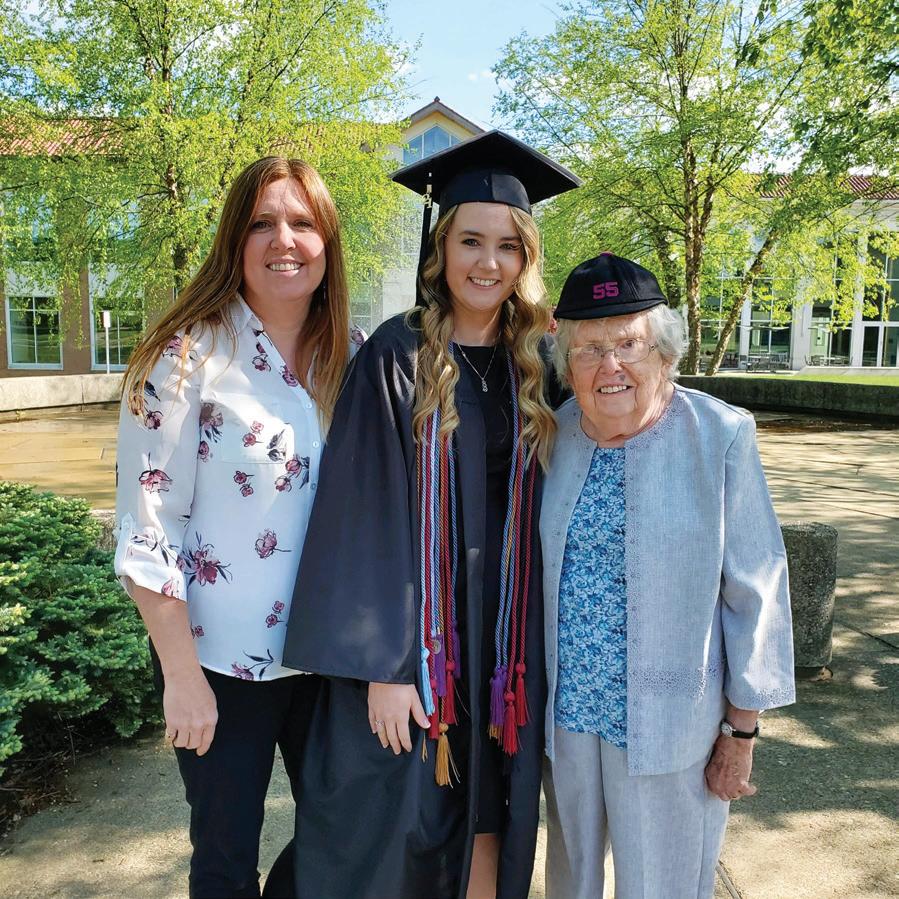
Cassidy is proud to say she is a third-generation alumni from Muskingum and loves sharing her journey with others.
”
“It’s one of those things you are so proud to say to someone,” she exclaimed. “I can say ‘oh I went to Muskingum. My mom went too, and so did my grandma.’ You feel like you are really part of something when they use the term Long Magenta Line. I really feel like I belong to The Long Magenta Line.”
”
1955
Doris George graduated from Muskingum
1993 2000
2021 2023
Christine Dobbins graduated with MAE
Christine Dobbins graduated from Muskingum
Cassidy Mast graduated with MAE
Cassidy Mast graduated from Muskingum
9
MAKING SPACE for the Future

As the keynote speaker for the May 4 Commencement ceremony, Debra Clausing Sudan ’85 shared a thought-provoking message with the undergraduate and graduate Classes of 2024.
“As graduates, you are thinking about your future,” she said, “but in order to move forward, you also need to be thinking about what and when you need to quit.”
Debra shared that she recently read the book “Quit: The Power of Knowing When to Walk Away,” by professional poker player and decision scientist Annie Duke. “The book led me to think back about some of my own life experiences and inspired my Commencement message,” she said.
“I have personally found that we often persist in pursuits that are not necessarily the best for us, whether in careers, relationships, or personal interests,” Debra explained. “Once we begin to do something, we have investment costs in terms of time, money, and emotions. Our identity often becomes defined by that activity or profession.
“Everyone who graduates today is ‘quitting’ their role as a Muskingum student, and moving on to the next step in their future. It feels risky to quit the known in any area of life and move into the unknown.
“And sometimes, after we take that next step, we might discover that we need to quit again and take a different path. We need to avoid getting stuck and looking backward at what our identity has been and what we sunk our efforts into. Instead, we need to look forward.
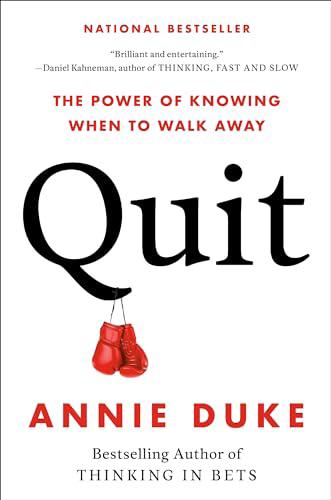
“But many times, in order to move on to better things personally and professionally, we need to stop doing some things so we can make space for our futures. As we start new things, we have to reevaluate what we have been doing and determine objectively what we should be quitting.”
She shared how discerning that is not always easy. “We often need others who can help us look outside of ourselves. Friends, family, mentors, coaches, and counselors can all help give us that broader perspective, which human nature makes it hard to see for ourselves. On our own, we tend to not always be objective, and this can lead to poor decision making, but others we trust can help us see what we are not seeing.
“We do need to have resilience and stick-to-it-iveness. This has likely been necessary to complete your education at Muskingum. Nonetheless, there are times when sticking to it is not the right thing to do. Quitting is not necessarily a bad thing – it can be the best thing for you. It is not a sign of failure, but rather can be a sign of bravery and strength.”
Debra is a groundbreaking transplant surgeon who serves as Division Chief of Abdominal Transplant in the Department of Surgery, Professor of Surgery, and Professor of Pediatrics at Duke University. In 2020, she was the first woman honored with Duke’s Master Surgeon Award and in 2018, she completed North Carolina’s first-ever abdominal wall transplant.
Debra began her transplant surgery career at the University of Nebraska Medical Center, where she became Professor of Surgery and Director of the Living Donor Transplant program. While in Nebraska, she developed pioneering techniques for successful living donor liver transplantation and for intestinal transplantation. In addition, she was the first female surgeon in the world to perform an intestine transplant in 1996.
She is active nationally and internationally in her profession, currently holding an executive board position in the American Society of Transplant
10
Surgeons. She is also President of the Halsted Society and recently served as President of the Intestinal Rehabilitation and Transplant Association.
Her clinical interests encompass all abdominal organ transplants – kidney, liver, pancreas, and intestine transplant. She is especially dedicated to efforts toward improving graft preservation and long-term graft function and patient survival, which is demonstrated through her development of a robust quality program at Duke and in her federally funded research initiatives.
Reflecting on her time at Muskingum, Debra thinks with great fondness about the small class sizes and how they led to deep connections. “I was able to get to know my professors very well, and we had very frank and frequent discussions about what comes next after college,” she recalled. “The small size of the campus also led to deep friendships through my classmates and my sorority.”
While at Muskingum, Debra played the flute in the orchestra and band, and was a member of F.A.D. and a resident assistant. She earned her Bachelor of Science degree in Chemistry, summa cum laude, with minors in Biology and German. She completed her M.D. degree and general surgery residency at Wright State University.
“Those types of experiences allowed me to grow as a person and to see what I wanted to do. I had not thought about medical school before I came to Muskingum, but that desire developed early on in my studies and discussions with my professors and progressed throughout my years on campus.”
Debra returned to campus for the fall 2023 Magenta Homecoming, when she received an alumni Distinguished Service Award. “I have lived out of Ohio since my graduation from surgical residency,” she noted. “With a busy career and family, I hadn’t visited the campus in a very long time. Attending Homecoming brought back so many nostalgic memories, and at the same time it was wonderful to see the new buildings and learn about the new programs and opportunities for today’s students.”
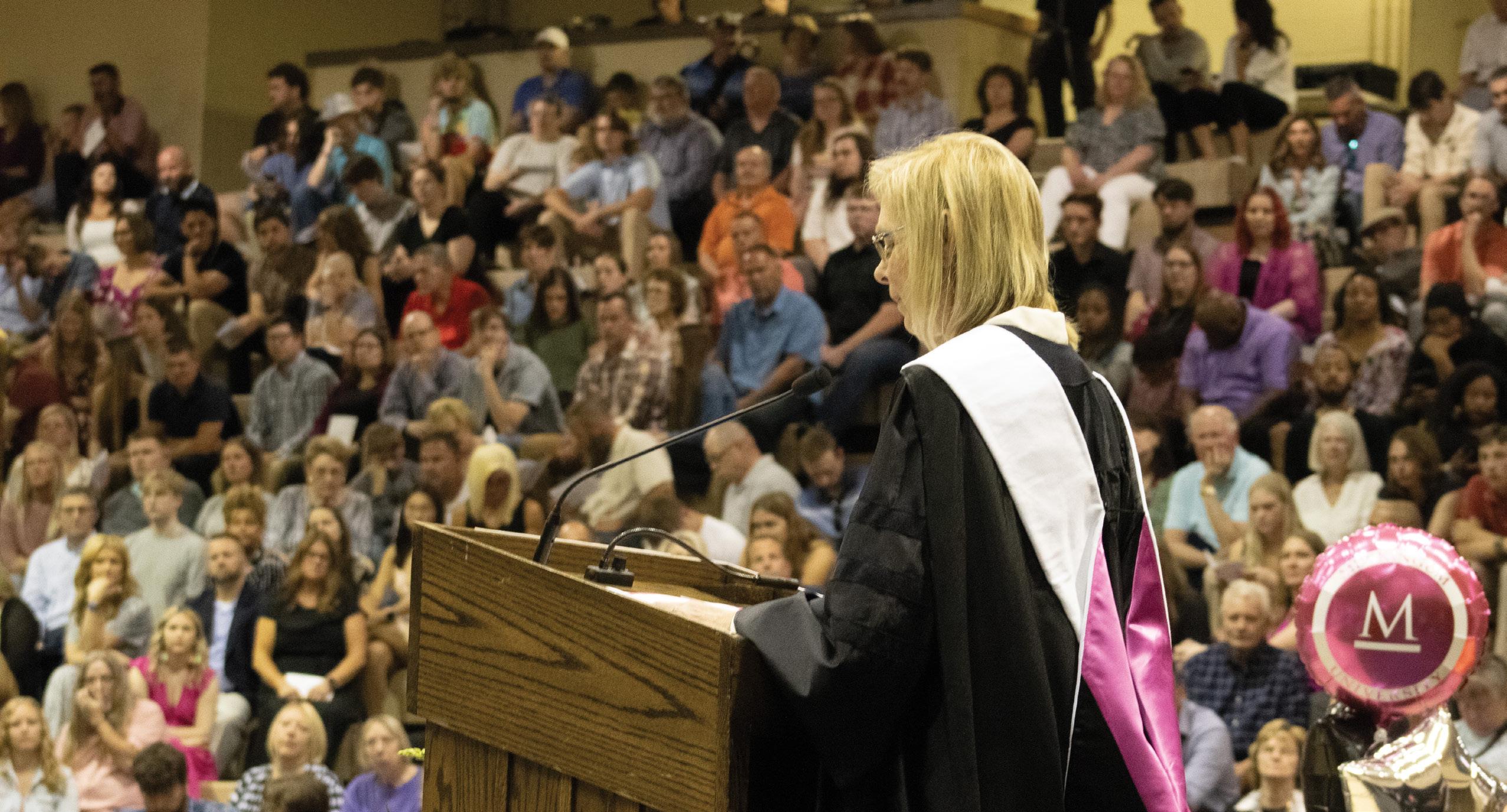
11
” ”
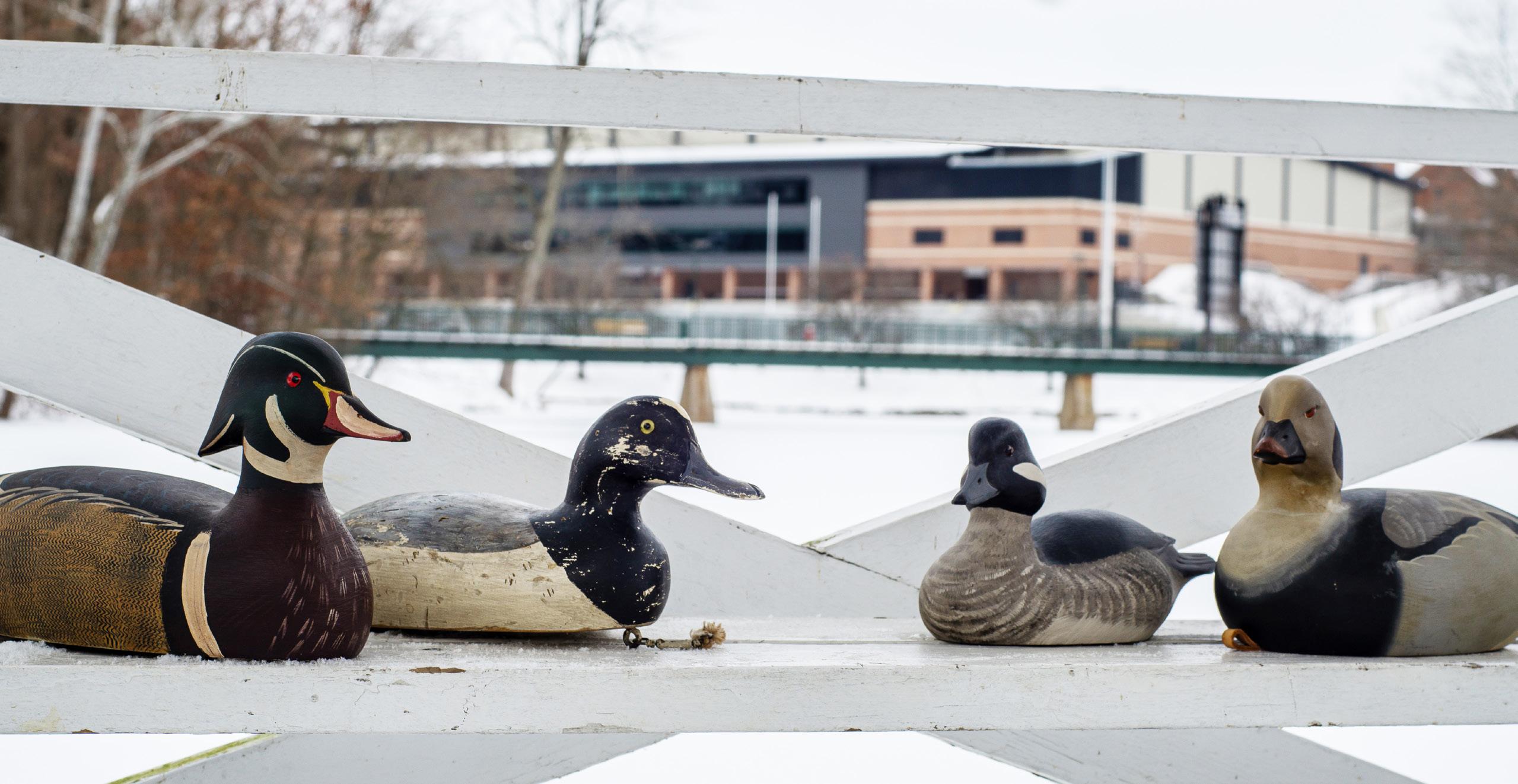
From the Lake TO THE gallery
Throughout March 2024, the Muskingum community and visitors enjoyed a fascinating Palmer Gallery exhibition of vintage and fine art duck decoys from the Janet Brown ’54 Rothwell and William Rothwell Decoy Collection, accompanied by student research posters and presentations.
Professor of History William Kerrigan, known for his research and teaching expertise in environmental, Ohio, and American history, is an avid bird watcher and bird advocate, who serves as the Conservation Committee Chair for the Ohio Ornithological Society.
During the fall 2023 semester, while attending a meeting with President Sue Hasseler, he spotted a pair of duck decoys and was immediately intrigued. That moment led to a unique, hands-on research and gallery exhibit project for the students in his spring 2024 American Environmental History class.
“We can learn a great deal about this history of conservation through the story of duck populations,” he explains. “It shows that while humans have the capacity to bring destruction to the natural world, we also have the capacity to reverse it. Although North America has lost nearly 30 percent of birds in the past 50 years,
waterfowl have had a 40 percent increase in population, due to smart environmental policies for preserving and restoring habitats.
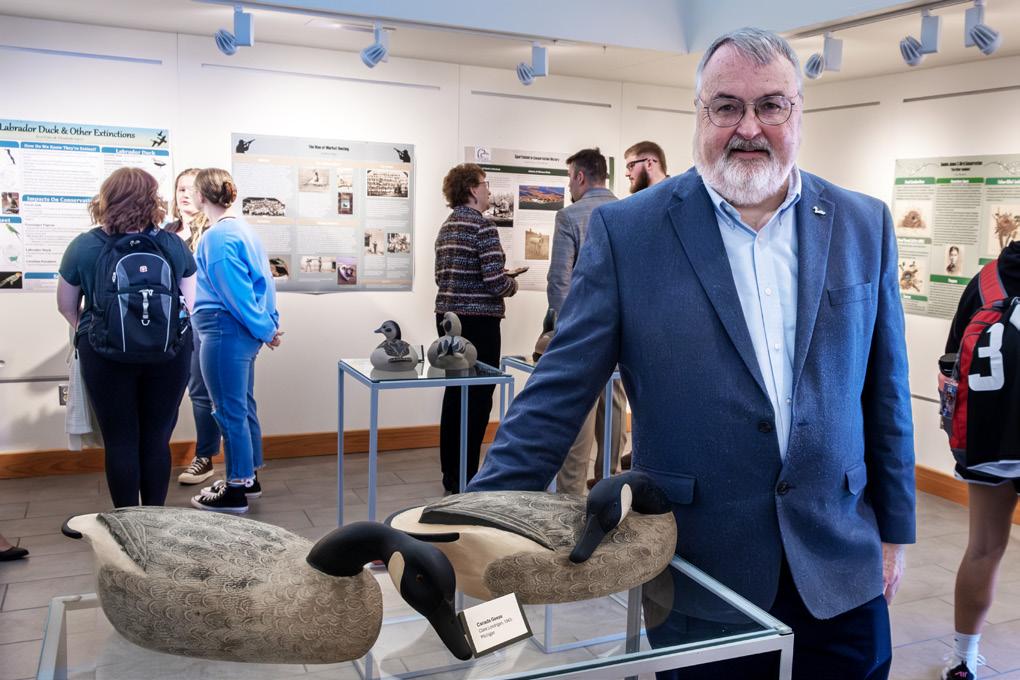
“My students created the museum-type exhibit, by selecting historical decoys from the collection, conducting research on the population history of each decoy species, and developing and delivering poster presentations, which provided a broader context,” he said. “Because the gallery availability was mid-semester, the work needed to be completed before Spring Break. I’m proud of how the group embraced the challenge and of the
quality of their work. They represented majors ranging from history to conservation science and animal studies, bringing interdisciplinary perspectives and collaboration to the project.”
Sophomore Eva Finni is double majoring in English and history, and especially enjoyed the independent nature of the project.
“It was very different from the usual class structure. Professor Kerrigan let us take the reins in our research and helped us as needed,” she said. “I had fun choosing what to research and I was excited to share my work and fun facts about my duck in talking with my friends and classmates, as well as through my poster presentation. Professor Kerrigan’s passion about ducks and other bird species energized us to learn all we could about them and their conservation.” Eva researched the Bufflehead duck and her poster focused on the Labrador duck and other extinctions.
The Ducks! exhibit, which ran from March 12-27, was well attended by members of the campus and surrounding communities. The display attracted a wide variety of audiences, including art enthusiasts, duck hunters, decoy collectors, and conservationists.
The two ducks which initially sparked Professor Kerrigan’s idea for the course and exhibit are part of a collection of more than 300 duck decoys gifted to Muskingum by Bill Rothwell.
“Janet and I collected the ducks together,” Bill recalled. “It’s especially fitting that they have a home at Muskingum, because the very first duck we bought was on a 1987 return trip from New Concord – Janet’s hometown – back to our home in the Chicago area. We stopped to visit an antique mall where Janet spotted a duck, fell in love with it, and announced then and there that we would collect them!
“As we built our collection, we researched the decoys, learning about decoy makers, who each have their own unique artistry and interpretation in both carving and painting ducks,” he added. “Decoys are prized as examples of American folk art as well as for their usefulness to hunters. We discovered where we could find the decoys, and we took many trips together over the years to decoy shows and antique shows, particularly throughout the Midwestern and Great Lakes states. In addition to the full-size decoys, we also enjoyed collecting very detailed miniature versions.
“I was so impressed by the work the students did with the exhibit,” Bill reflected. “They added a different and wonderful twist to what the decoys represent. Those two Merganser duck decoys that were in President Hasseler’s conference room certainly did their job well when they lured in Professor Kerrigan.”
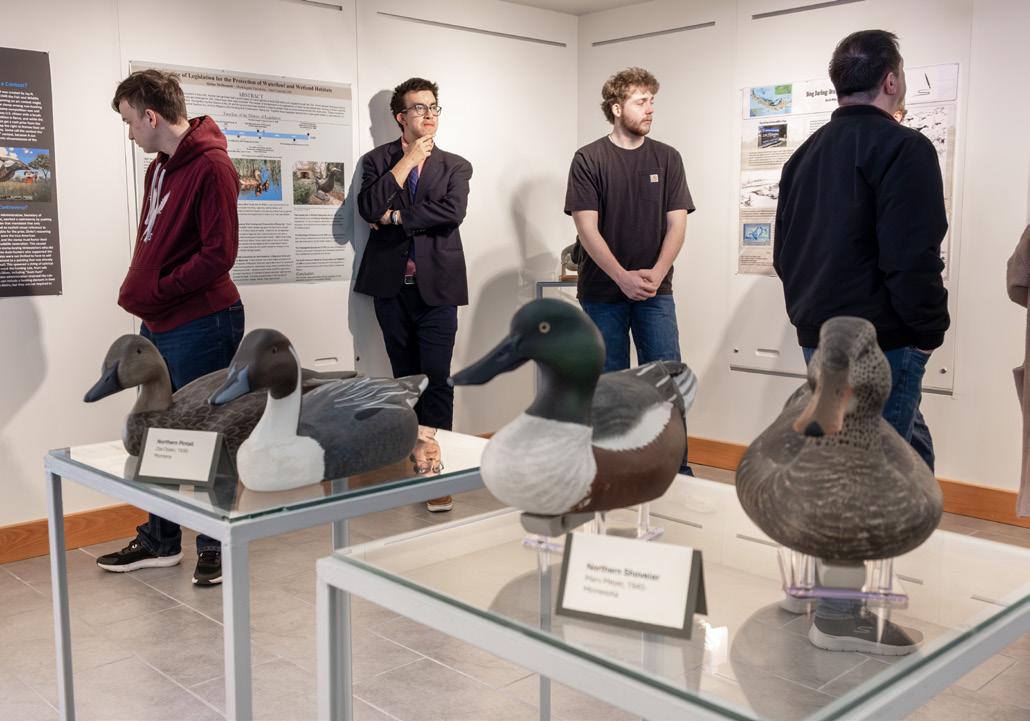
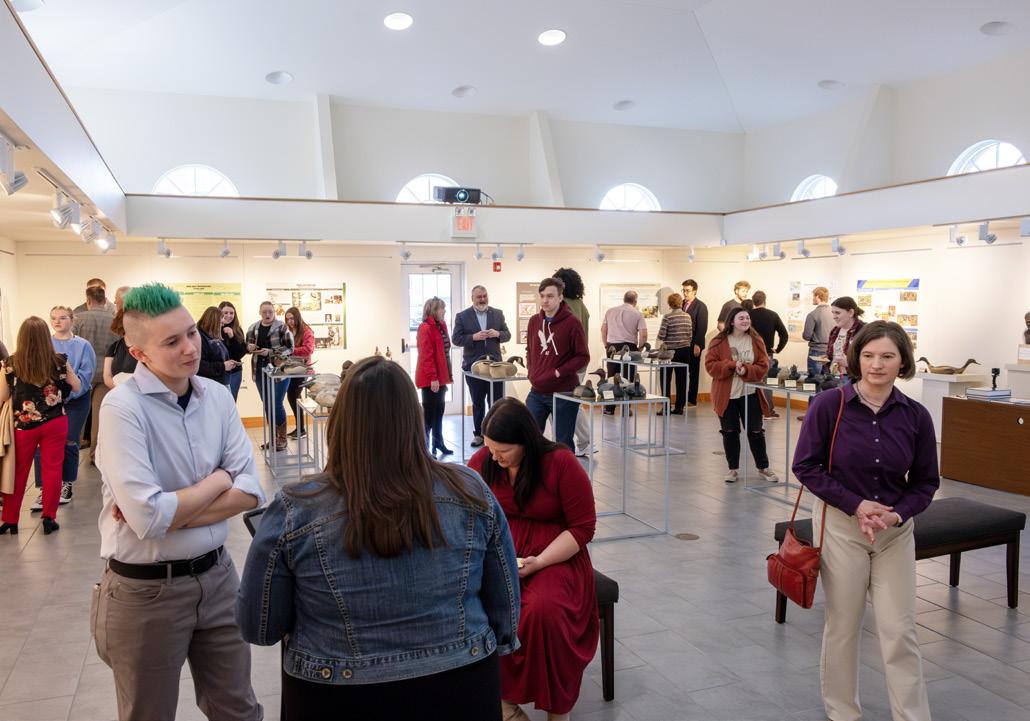
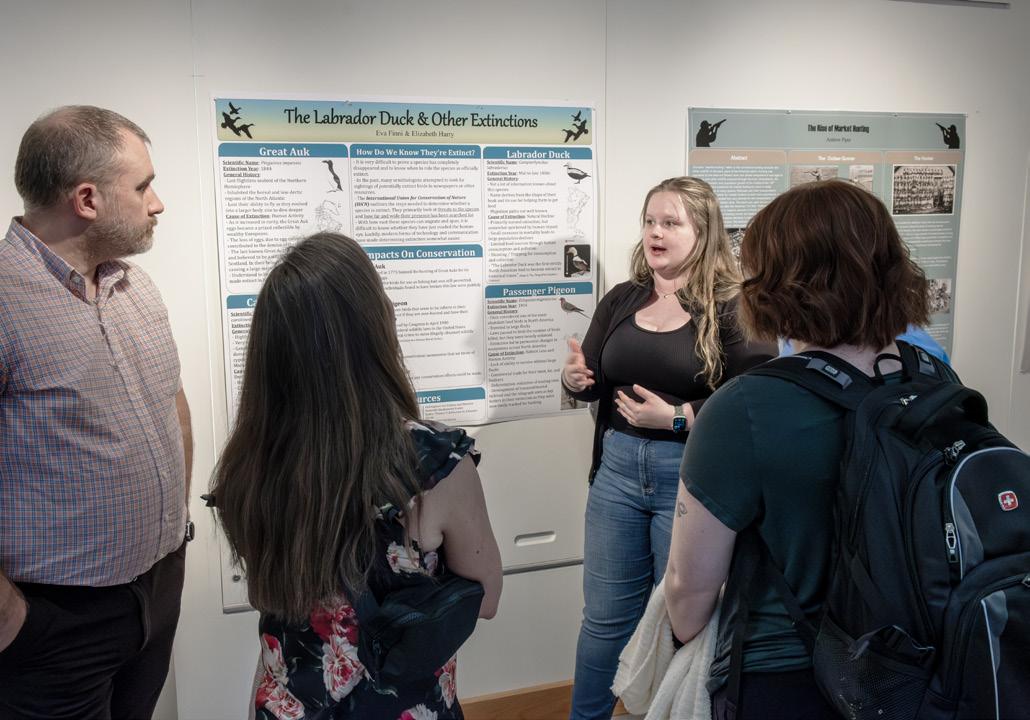
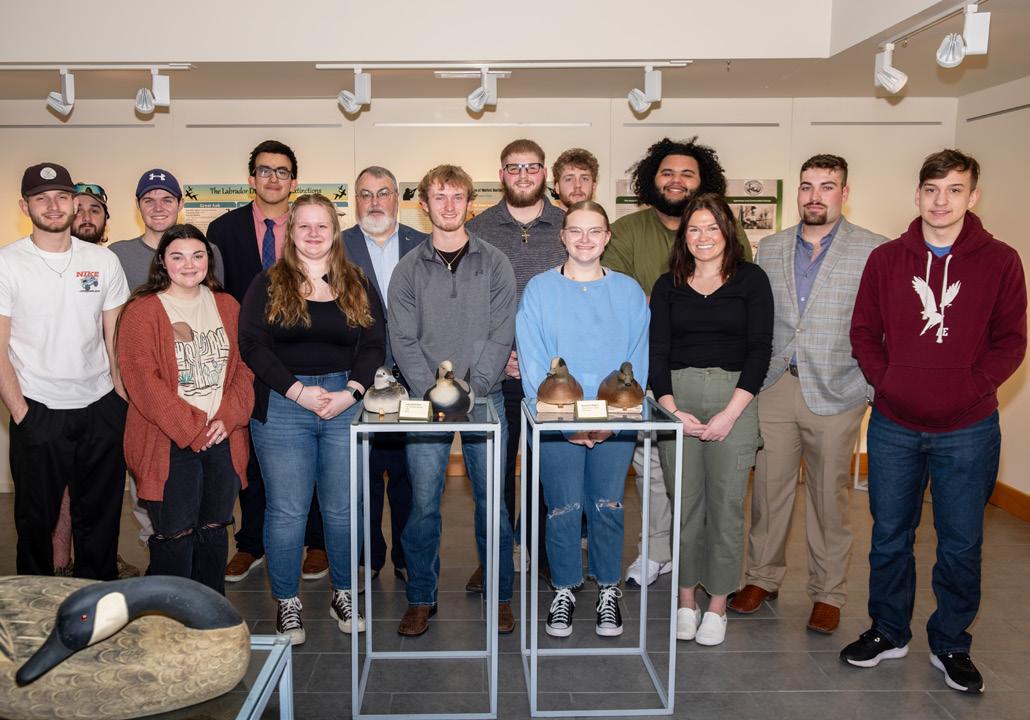
13
Looking back on his experience with Ducks!, history major Kennath Dorsey said, “I loved that it was a very new and creative way of learning. We had to be flexible with what we were doing, and we had a hard deadline to complete the project, which was great preparation for real-world work. The best part of the experience was seeing everyone’s presentations and learning from each other.” Kennath will complete his degree in December 2024 and plans a career as a museum archivist. He produced a poster on “Duck Hunters in Popular Culture,” which focused on the way duck hunters have been perceived from late 19th century paintings to the cartoon character Elmer Fudd to the contemporary reality television show, “Duck Dynasty.”
Other student presentation topics spanned the history of the decoy, federal duck protection legislation, the conservation revenue Duck Stamp program, Native Americans and birds, sportsmen and conservation, history of North American wetlands, history of market hunters, and profiles of cartoonist and National Wildlife Federation co-founder Ding Darling and illustrator Genevieve Jones, known as the “Other Audubon.”
Duck species researched by the students included the American Coot, American Wigeon, Blue-wing Teal, Bluebill, Brant, Canada Goose, Canvasback, Common Loon, Green-wing Teal, Long-tailed Duck, Mallard, Northern Pintail, Northern Shoveler, Redhead, and Wood Duck.
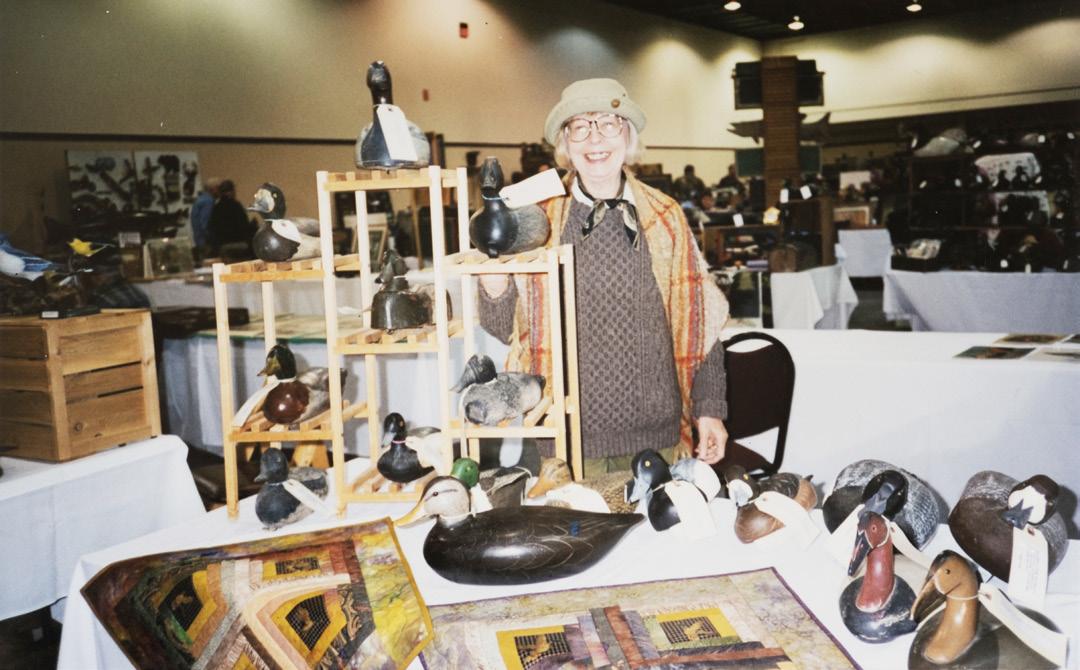
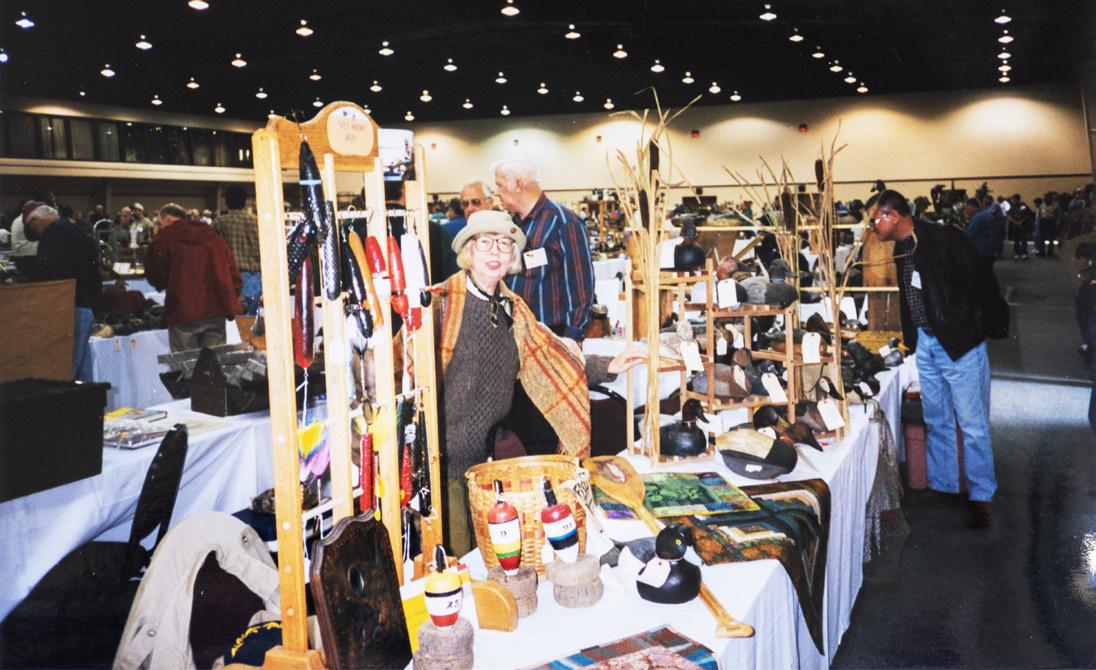
Janet Brown ’54 Rothwell and William Rothwell
Janet Brown ’54 Rothwell (1932-2012) earned her Muskingum bachelor's degree in home economics education and completed her master’s degree in home economics education from Northern Illinois University. After teaching in California and Ohio, she established the Home Economics Department for the newly opened Glenbrook South High School in 1962 (Glenview, Illinois), retiring in 1992 as the instructional supervisor for Home Economics and Health. She was an accomplished fiber artist, quilter, and seamstress, and was a leader in several quilting guilds in the North Shore region of Chicago. She also enjoyed collecting quilts by other artists.
Bill Rothwell is a 1958 graduate of the University of South Dakota. He earned his master’s degree in Industrial Relations at Loyola University and retired from the Naval Reserves after 27 years of service as a Commander. Following a business career, he served as the Director of the Institute for Business and Economic Development at Oakton Community College. He is an avid fisherman and has a passion for creating Muskie lures.
The Rothwells’ generosity also supports educational excellence at Muskingum through the Janet Brown Rothwell Chair in Education, currently held by Associate Professor of Education Keith Eberly, and the William and Janet Rothwell Endowed Scholarship for Graduate Study in the Field of Education.
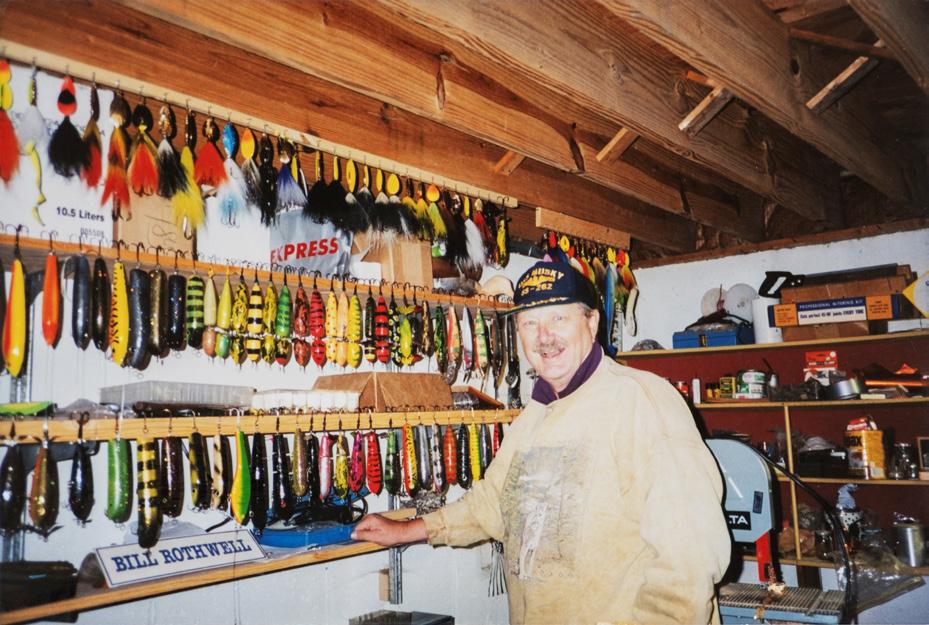
Dr. Gladys McGarey: The Well-Lived Life
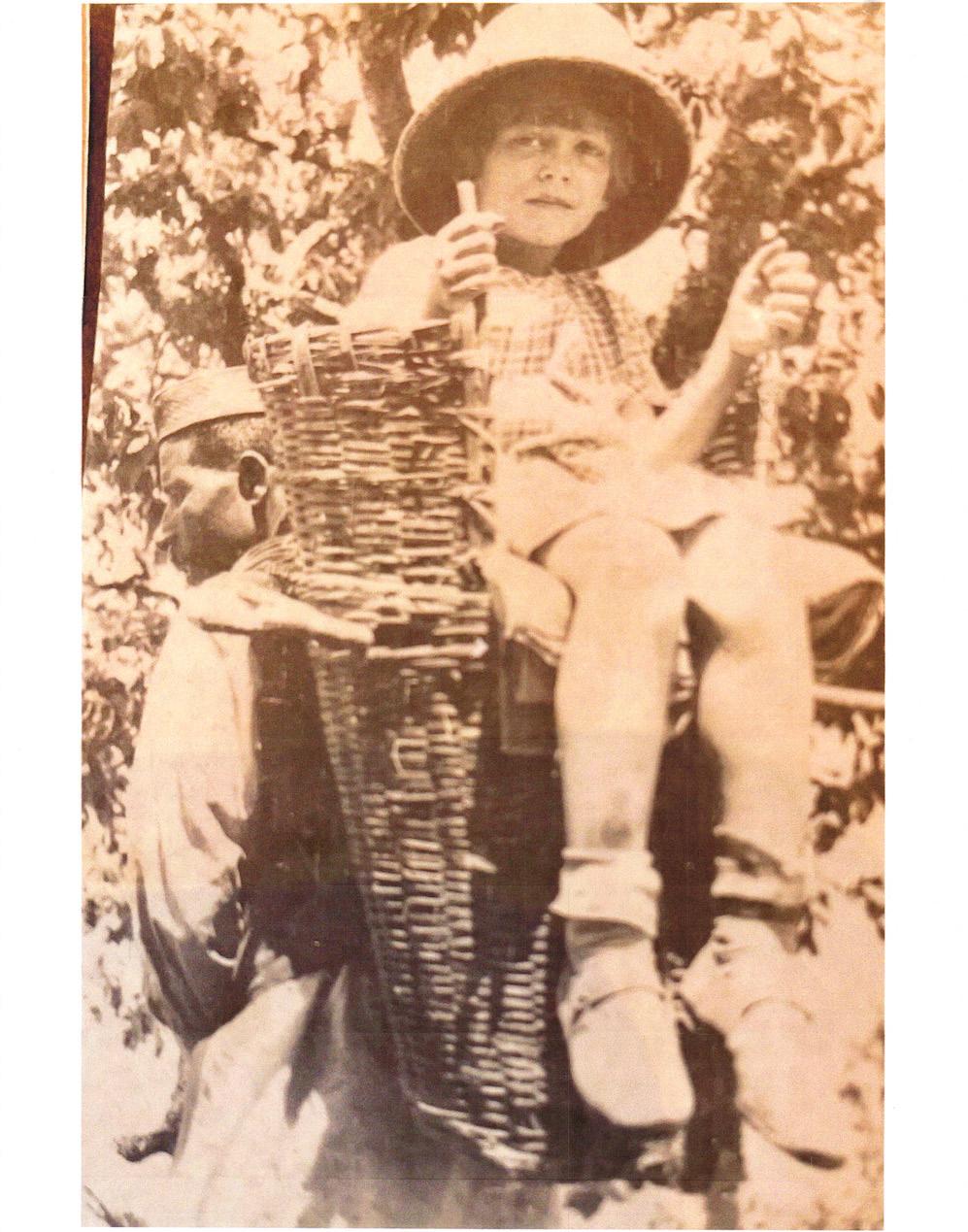
Dr. Gladys Taylor McGarey ’41, author of “The Well-Lived Life: A 103-YearOld Doctor’s Six Secrets to Health and Happiness at Every Age,” is internationally known as the “Mother of Holistic Medicine.”
Born in Northern India to medical missionary parents, “I always knew I wanted to be a doctor,” she recalls. “My mother and father were both osteopathic physicians. My mother earned her medical license in 1913, yet when they traveled to India in 1914, she was identified as ‘baggage’ on my father’s passport.
“There was no question that I would attend Muskingum. It was well known to our family due to its link to the United Presbyterian Church. My brothers and my sister were all Muskies, and it was very important in shaping our lives,” she explained. Gordon Taylor ’44 became a minister, Margaret Taylor Courtwright ’39 became a nurse who served in India, John Taylor ’37 was an athlete who set a record as a long-distance runner and became a dentist, and Carl Taylor ’37 was on the debate team and earned his medical degree from Harvard, ultimately becoming the founding chair of International Health at Johns Hopkins University.
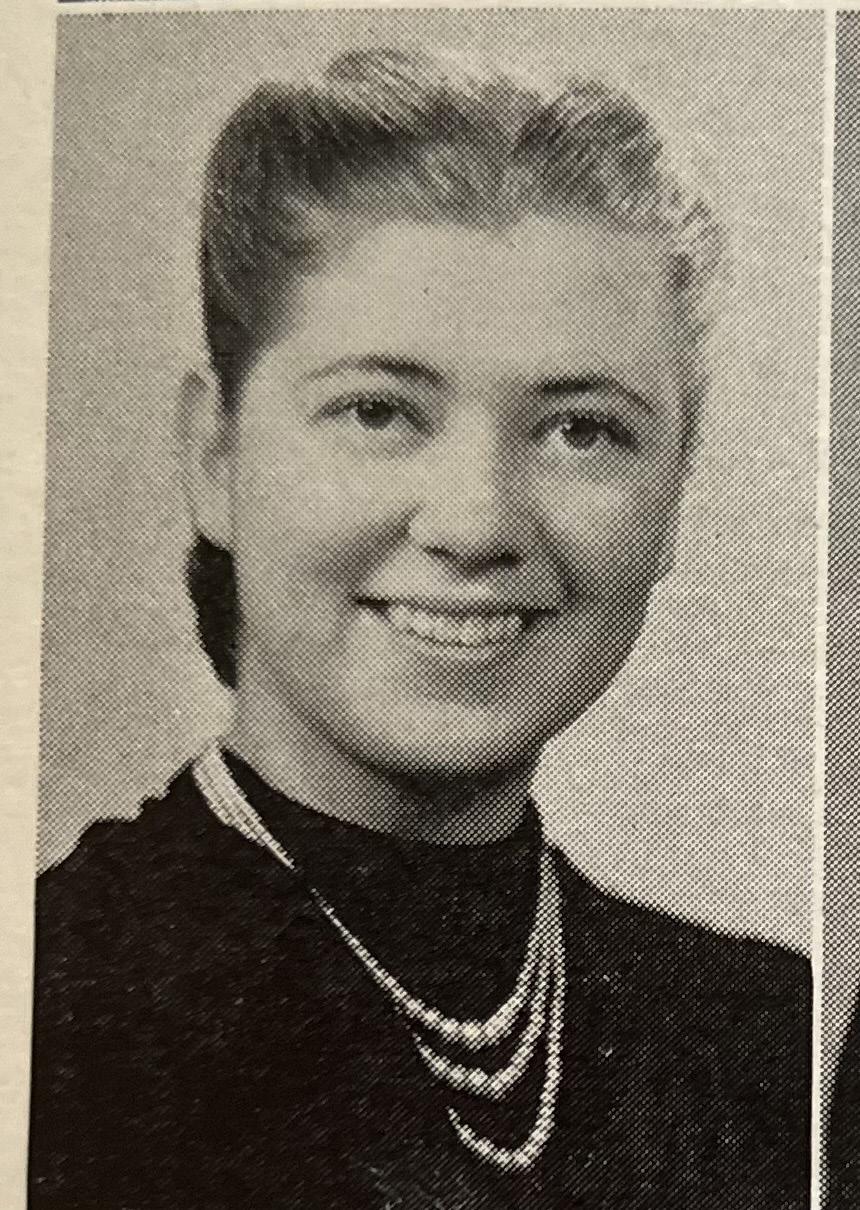
“I didn’t know anything at all about the United States when I arrived in New Concord in 1936,” Dr. Gladys remembers. “I loved being at Muskingum. The dining hall was a wonder to me with foods such as bread and ice cream, and the campus was beautiful. As soon as it got cold, people were ice skating on the lake. I studied pre-med and was a member of F.A.D. and the pre-med club. I also worked in the library, putting numbers on the books. The professors were a huge influence on me, they were always very helpful, and they invited us into their homes for special events. It was a wonderful community.
15
” ”
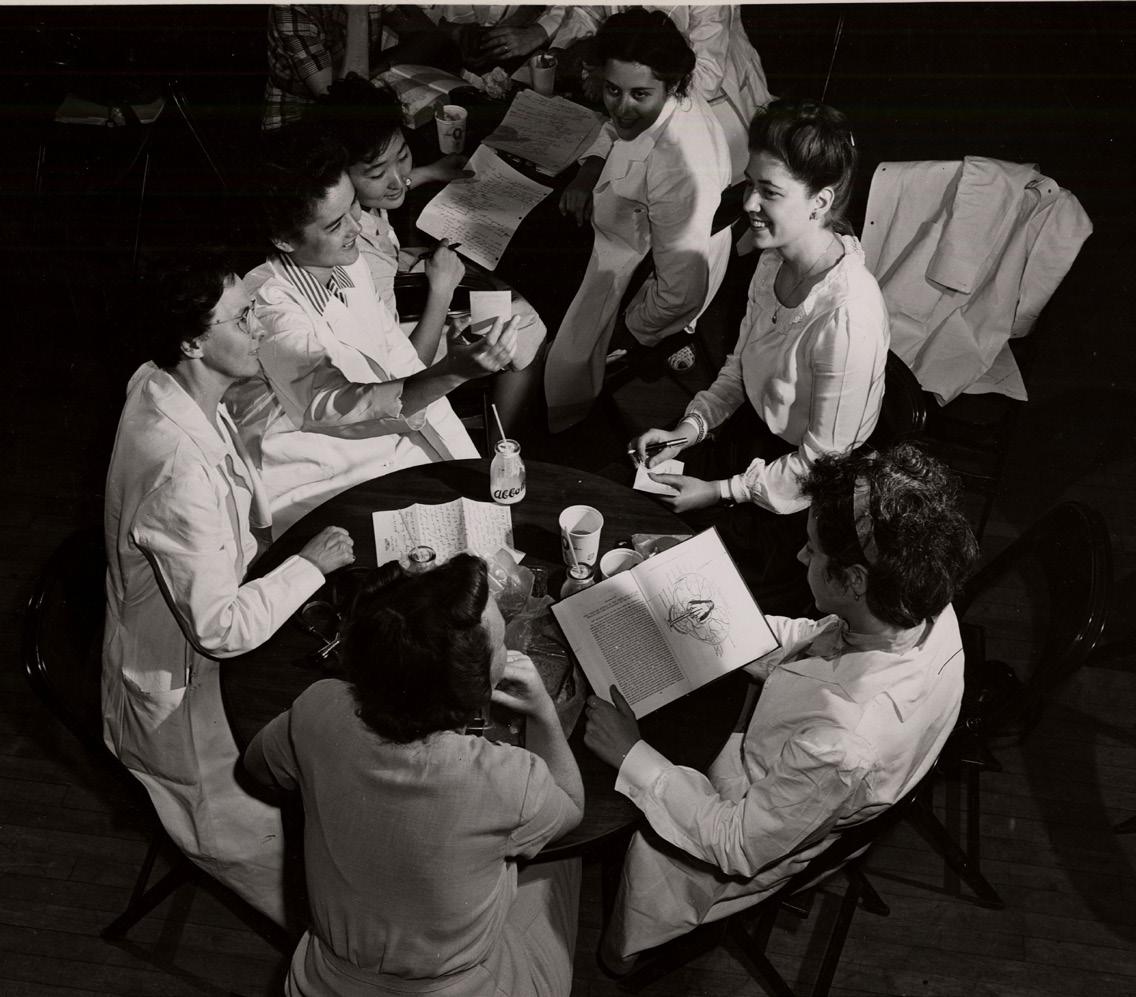
“After graduation, I moved to Philadelphia to attend the Women’s Medical College, which at that time was the only medical school for women in the country. They told us that we would have to be tougher and smarter than the guys who were graduating from medical school. Of our entering class of 50, only 25 graduated – they purposely made it very hard. But I was ready because Muskingum had given me a great foundation. I earned my medical degree in 1946.”
After establishing her first medical practice in Wellsville, Ohio, she relocated to Phoenix, Arizona in 1955. There she centered her family medicine practice on prevention and wellness, while she and her husband Bill McGarey raised six children.
She became a pioneer in new ways of thinking about disease and health, co-founding the American Holistic Medical Association in 1978. “There were a group of five of us, all board-certified physicians, who had begun to think that medicine should have more to it than what we had been taught in medical school. We wanted to go beyond the idea that medicine is a war on disease and incorporate the broader view that as human beings, we can choose to focus on enhancing life, on healing and hope and love. We began our work with symposiums, working alongside the American Medical Association, and our work spread from there and eventually went around the world.”
She created the Foundation for Living Medicine in 1989 to provide education on integrating holistic medical practices with traditional medical care. She has traveled to Tibet, India, Afghanistan and other countries to teach and provide humanitarian aid. Her many honors and awards include a Muskingum alumni Distinguished Service Award (2001).
“The Well-Lived Life” was first published in hardback in May 2023 and released in paperback in April 2024. “I had previously written five books about the practice of medicine,” Dr. Gladys explained. “With this book, I want to share the emphasis on love and life in healing with a broad audience, and communicate the very essence of what I feel medicine is about.”
88 years after first setting foot on campus, the impact of her Muskingum education still resonates for Dr. Gladys. “I truly loved my time at Muskingum,” she reflected. “I taught my children the Muskingum fight song and all these years later we still know it. I’m going to sing it for you now, along with my two sons who are here with me today.” And they joyfully did.
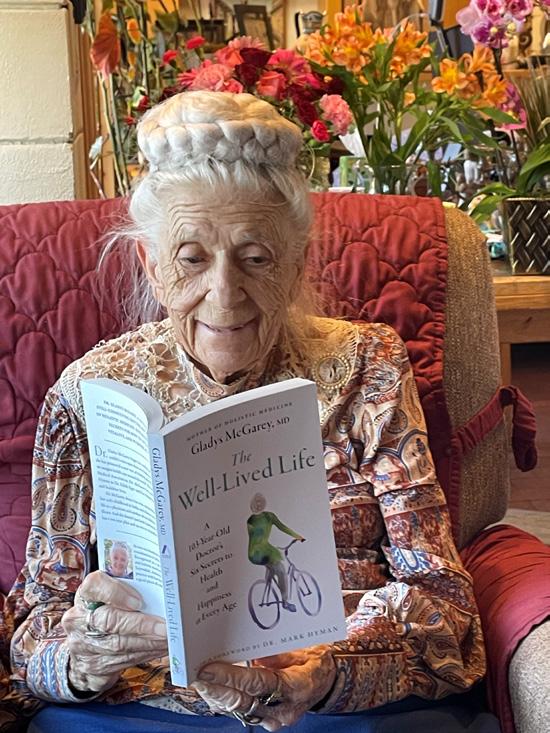
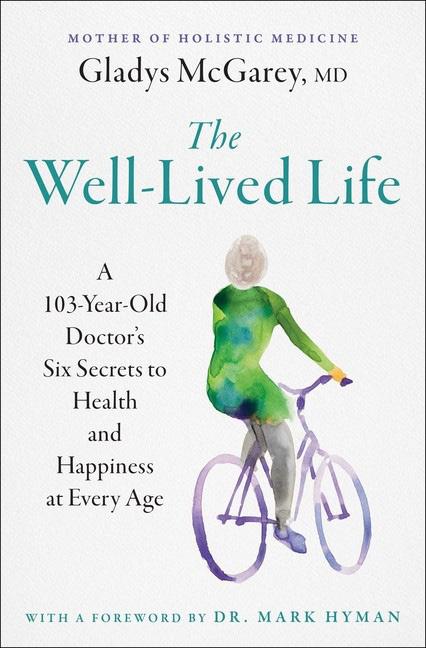
16
Dr. Gladys Taylor McGarey’s
1 4 2 5 3 6
Spend your energy wildly
All life needs to move
You are here for a reason
You are never alone
Everything is your teacher
Love is the most powerful medicine
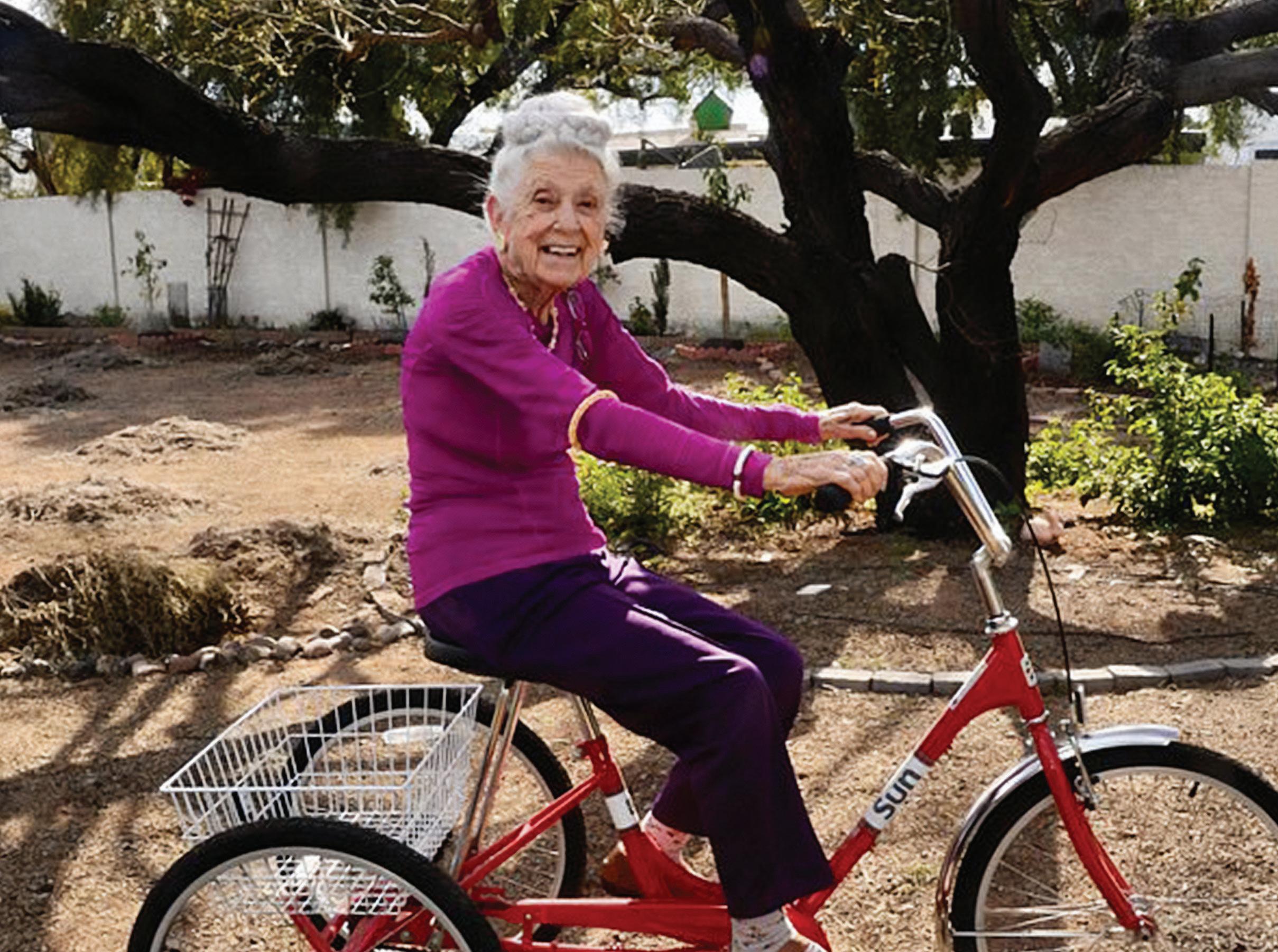
17 secrets 6
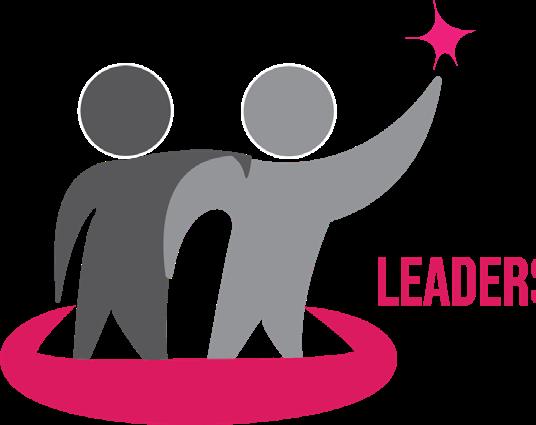
Leading with
Emotional
According to Dr. Travis Bradberry and Dr. Jean Greaves, emotional intelligence is the #1 predictor of professional success and personal excellence.
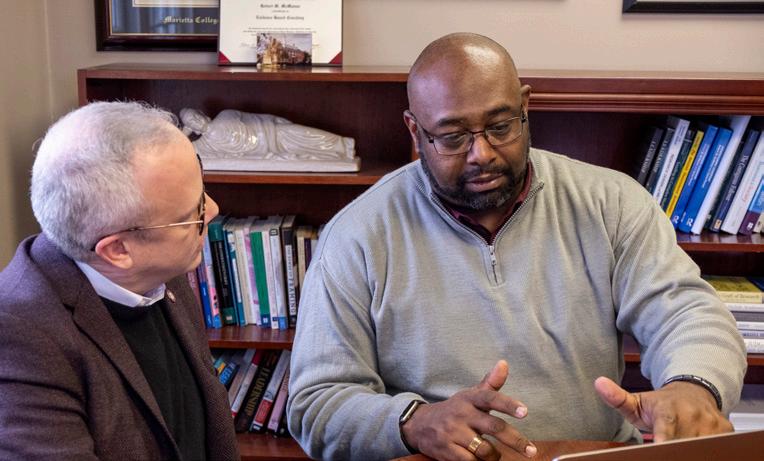
With that in mind, Executive Director of Applied Leadership Dr. Robert McManus and Associate Director of Applied Leadership Dr. Henry Stanford launched the Leadership Academy’s first workshop – Developing the Leader – with a focus on emotional intelligence.
To share in the application of emotional intelligence, Robert led an interview-style session with 1986 Muskie alums Bill Goetz and Darrell Hazell.
Bill is the chief executive officer of DYMA Brands, a manufacturer of dry and liquid portioncontrol condiments, seasonings, and dry blended mixes. He has held leadership positions throughout his career.
Darrell is a retired wide receivers coach for the National Football League’s Minnesota Vikings. Prior to that, he has twice served as an NCAA Division I head coach and held other leadership positions in collegiate football.
While they have had different career paths, both have used emotional intelligence throughout their careers to work with individuals as well as lead teams. You can watch the full interview by scanning the QR code on page 20.
“Cintas recruited here on campus, and I started as a management trainee in Washington D.C., where I eventually got promoted to a service manager, which means I was managing 10 to 12 individuals, who were all at least double my age as well as very diverse. This is when it hit me about the importance of leadership,” Bill said. “I benefitted from Cintas and its leadership culture, which provided leadership training. Your review would be two minutes on performance and the rest would be on your leadership traits and characteristics.”
Bill learned to watch other leaders to see the good and bad, and the pieces you want to take from it understanding that leadership is the key differentiator. When a student asked Bill what was the one thing he did every day, he replied, “At the end of every day, I think about that day from the standpoint of interactions, and I think about what I should have said or could have done differently. I think about what I can do to get better.”
“I grew up in a profession where people are always looking for their next move, so one foot in and one foot out of the door, which is such a robbery to the people you are working with and for,” Darrell stated. “I was always of the mindset that I am going to do the greatest job I can at the place I am in to make us the best we can be at that time. I truly believe you are recognized for the work that you do.”
18
intelligence
Bill and Darrell acknowledge that this generation of students puts this pressure on themselves to have it all figured out. Both also say that you have to get stuff done; you have to do the work. “I always told my kids be enthusiastic, raise your hand, do a great job, and keep your head down, and great things will happen to you,” Bill said.
Darrell also shared some advice for current students, “You need to build a network of people who have been successful to learn from to help you grow. You also have to put in the work and improve in every single opportunity you have.”
They also shared a little about their younger selves and their time at Muskingum. Bill and Darrell were roommates and have remained friends for the last 42 years, so the relationships they built are some of their fondest memories. Academics also played an important part in their journey.
“I came to Muskingum to play basketball, which is what got me here,” reflected Bill. “I ended up with a degree in economics and communications, and that communications piece is something I have taken with me. The foundation of having to write and speak from certain communication classes was a game changer for me.”
In addition to his classes and athletics, Bill was involved with WMCO and had his own radio show, broadcasted baseball games, and read the sports news. Darrell also was involved with WMCO when he started Muskingum Women’s Sports Talk program, where he would interview female athletes. It then morphed to Muskingum Sports Talk that covered all athletics.
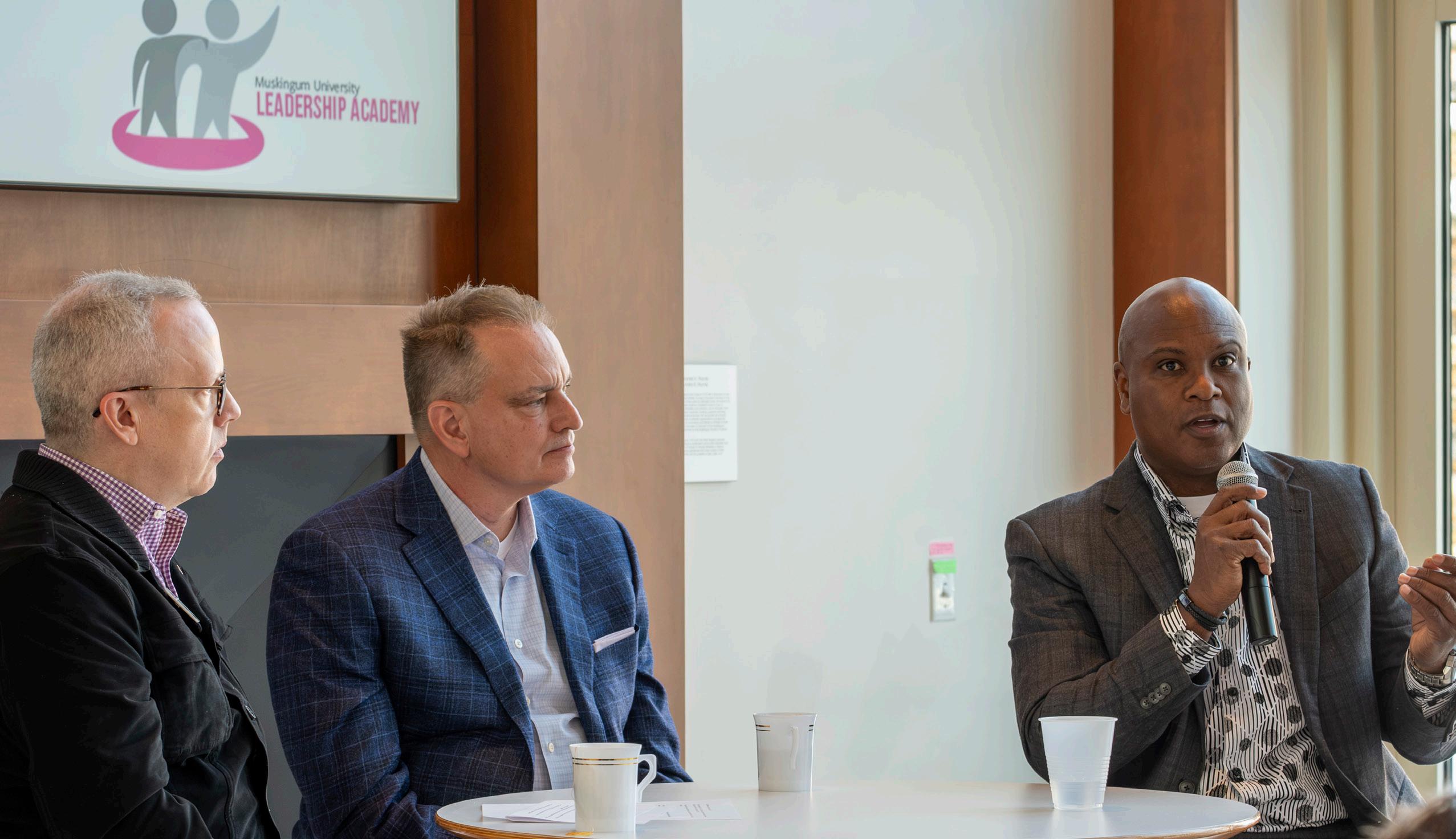
“The relationship you get to have with your professors changes your life,” Darrell said. “You remember those moments, those five-minute conversations, and how life-changing they were. They had a significant impact.”
19
Darrell commented, “You don’t quite know who you are, but you are trying to figure it out. You are carving out the person you want to become. You look back and think ‘Was I really like that?’ It is pretty neat to see the growth of yourself as you look back.”
That growth and development was the driver for the creation of the Leadership Academy. When Robert joined Muskingum University, he was not only charged with developing the new graduate programs, he also was charged with developing a program that would enhance the leadership capacities of the University’s traditional undergraduate students.
In January 2024, Robert and Henry launched the Leadership Academy, a four-semester leadership education program that takes the students through leadership as a process.
“The process looks at the leader, the follower, the context, and moving towards a goal,” Robert shared. “We developed a series of workshops that focuses on each one of those areas. After completion of each workshop and monthly touchpoints, students will receive a digital badge, and if they complete the entire program, they will receive a certificate.”
The process of leadership is about progressing, so after each workshop students participate in monthly touchpoints that help them apply the curriculum to their daily lives. Henry, who led the first workshop, has facilitated the monthly touchpoints. These gatherings allow students to express themselves and discuss how they are applying what they have learned.
“Students have shared that for the first time they listen to other students and learn and understand what they are going through,” Henry said. “From the first touchpoint to the end of the semester, I have seen students be more open and relaxed. Students that were shy are now sharing in the conversation; I see students growing and expressing their emotions.”
Laney Hitchens ’25, a digital media design major from Pleasant City, Ohio, hadn’t thought much about emotional intelligence when she signed up to take the first workshop. “My favorite part of the workshop was taking the quiz, learning things about myself that I didn’t even realize, and then going through the touchpoints and being able to apply them. Each
touchpoint I would pick a topic and throughout that month I would really work on it and apply it in my classes and my personal relationships.
“I liked having a one-on-one touchpoint and then having group sessions. I liked seeing how the other students were implementing it in their lives. I thought, ‘if they are looking at it like this, maybe I should try looking at it like that.’ I liked it so much I signed up for the fall workshop.”
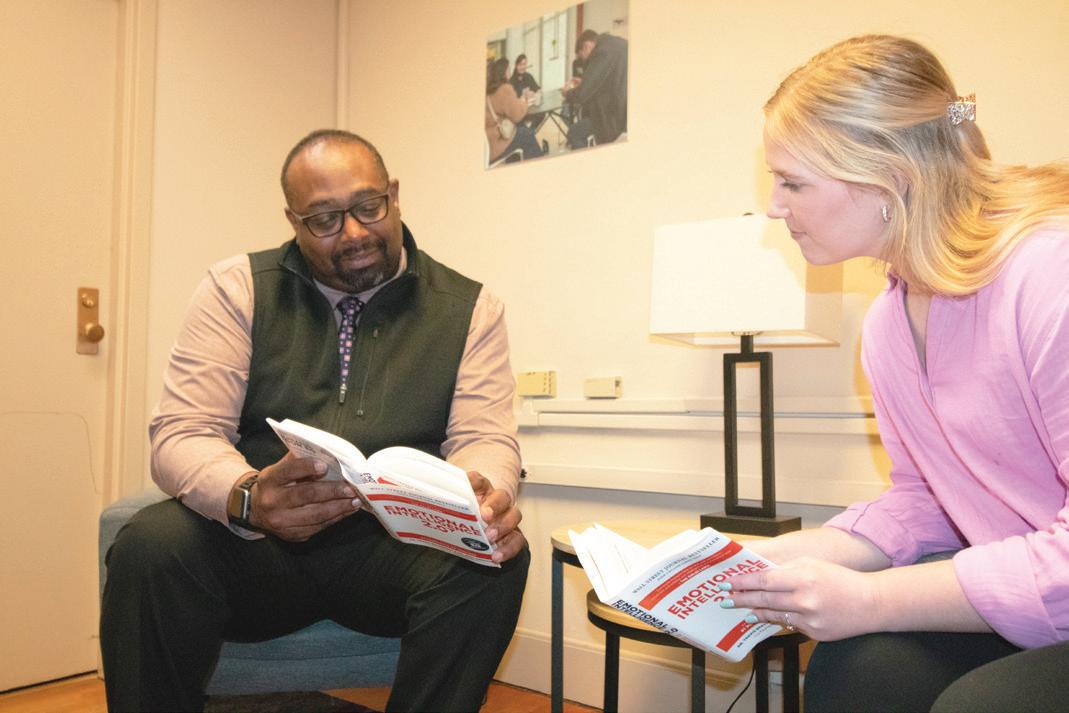
”Laney wasn’t sure what to expect and liked the workshop and the touchpoints, noting that they helped her continue to learn and grow and apply what she learned. “One of the main things I worked on was relationship management, whether it was with my family, professors, or bosses, I definitely think my communication has improved. I am not as nervous to talk to people. I also focused on self-management, and realizing the only thing I can control is how I react has been really helpful for me to manage my stress, and it’s okay to take a breather.”
Bill and Darrell were happy to be part of the inaugural workshop. Both acknowledged they got to where they were with help. “We hope we were able to give them some vision, something to think about,” Darrell said.
Bill added, “The only thing you will take forward in your career, and the thing you will remember, is the impact you have on other people.”
”
20 Scan the QR code to watch this Leadership Academy session.
91
40
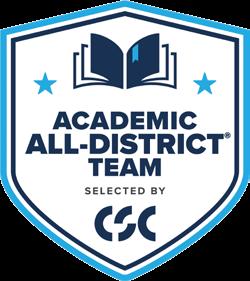
CSC Academic All-District Honors
7
All-Region Honors
2
4

National Qualifiers Programs Ranked in Top 25/Receiving Votes in Top 25
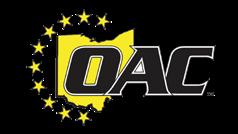
All-OAC Honors
7
All-Ohio Bowling Conference Honors
3
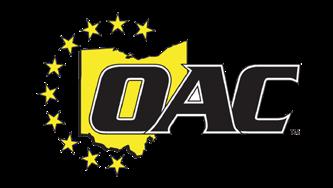
OAC/OBC Newcomer of the Year


2
1 31 20 Academic All-OAC Honors
OAC Scholar Athlete of the Month
1
National Coach
11
OAC Player of the Week Honors
All-Ohio and Academic All-Ohio Honors
16
SAAC Student Athletes of the Month
1
National Coach
NCAA Regional Championship & Super Regional Appearance
of the Year Finalists
of the Year
By the
ATHLETICS -
numbers
- Men's Bowling - Women's Bowling - Softball - STUNT - Craig Holycross (Archery) - Doug Smith (Women's Bowling) - Craig Holycross (Archery Head Coach) Learn more at www.fightingmuskies.com - Softball Women's Bowling Collegiate Club Champions 21 Championships All OAC Tournament/All Region Tournament Honors
MINUTE WITH A MUSKINGUM SOCIETY MEMBER
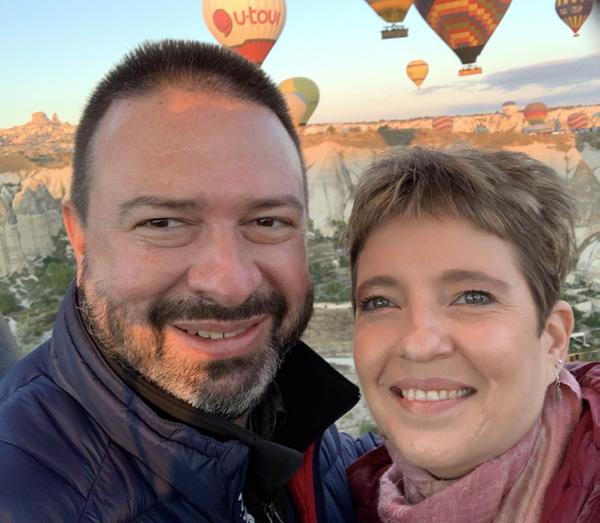
Both Scott ’92 and Helen ’92 Briggs chose Muskingum because of the friendly and welcoming atmosphere. “It immediately felt like the place I belonged, and we both still feel that way today,” Helen said. “The Muskie ‘Hi’ and the willingness to help made it seem like home,” Scott added.
Helen majored in biology and minored in chemistry. She began her career in histology in a hospital laboratory, but after some time was ready for a change. “Muskingum taught me to be outgoing and to be open to different ideas,” she recalls, “and it is where I discovered I love bringing people together. I drew on those capabilities and transitioned to human resources recruiting for the business world nearly 20 years ago. I have been with IBM since 2017, where I focus on recruiting high-level executives.”
A business administration major with minors in marketing and history, Scott was a four-year soccer player, serving as a captain for two years, and a member of Kappa Sigma. “Those leadership opportunities and the networking skills that I developed gave me the confidence to connect with people and shaped my collaborative approach to work,” Scott explains. “Immediately after graduation, I worked in a small industrial service firm. For the past 26 years, I’ve been with Sherwin-Williams Company, where I currently manage North America operations for Sherwin-Williams stores.”
“While at Muskingum, I lived in the Volunteer House on Lakeside Drive,” Helen remembers. “Under the guidance of Rev. Jerry Beavers, I volunteered for the Village of New Concord and Guernsey Memorial Hospital. That commitment to helping others remains an important part of our lives today.”
Scott and Helen spent nearly 10 years traveling to Haiti as volunteers with church and non-profit groups and hope to resume their visits when it is safe. “Because we were able to lead and to try different things at Muskingum,
we found the joy that comes from being out of your comfort zone,” Scott reflected.
Scott and Helen are deeply committed to volunteering for Muskingum. “We learned so many important values there and we can’t be any more thankful. We love the well-rounded education we received. It has served us well, and we are so happy to give back and to go back,” Helen said. “It’s well worth the effort to visit, see how the campus looks today, and learn about all the good things that are happening.”
“We go to Homecoming every year and help out wherever we are needed,” Scott explains. “It’s great to see Muskies from so many different classes.”
Scott and Helen were excited to be part of the inaugural Khanna Career Connections Conference in September 2023. “We presented on the topic ‘The Offer Is In. Now What?’,” Scott said. “We really enjoyed the event and were very impressed by the students,” Helen added.
For both Helen and Scott, being part of the Muskingum Society is an important way to give back. “We each had unexpected financial difficulties during our time as students and were at risk of having to leave Muskingum,” Helen remembers. “Without the help we received from the financial aid office, we would not have graduated. Now we can help make sure that students who find themselves in similar situations today are able to stay and graduate.”
“Muskingum recognized that we had potential and they gave us the financial help we needed to fulfill it,” Scott said. “Through the Muskingum Society, we can do our part to help new generations of Muskies.
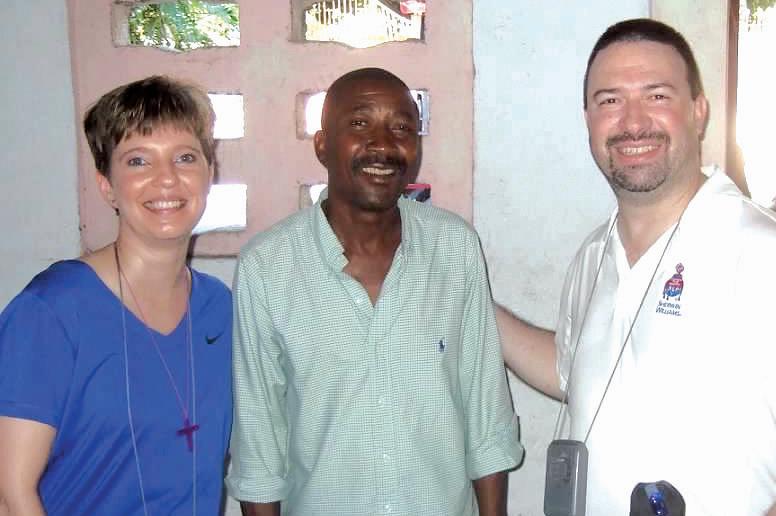
“We are so proud to be Muskies,” he added. “We are always talking about Muskingum to others.
McKenzie Bonnett ’23, is the daughter of close friends, and we are thrilled that she chose Muskingum and is now a Muskie alum!”
Create a life more abundant
From now until June 30,
you can help current and future Muskies live a “Life More Abundant” with your financial support.
• Make a gift of any amount to the Muskingum Fund, which supports students and their educational needs, including financial aid and scholarships.
• If your employer offers a matching gift program, increase the impact of your gift. Your employer’s match counts toward your membership in the Muskingum Society or Magnus Society.
• Gifts can be made in monthly installments or as a single contribution.
Visit www.muskingum.edu/giving or scan the QR code to make a gift online.
For more information, contact Institutional Advancement at advancement@muskingum.edu or 740-826-8130.
Join the Muskingum Society or the Magnus Society!
The Muskingum Society is open to all alumni and friends who make an annual commitment of $1,000 or more.
The Magnus Society is open to alumni who:
Graduated between 2015-2024
make an annual commitment of $250+ ($21 monthly)
Graduated between 2005-2014 make an annual commitment of $500+ ($42 monthly)
Muskingum Society and Magnus Society members receive special invitations to University events, recognition on the donor wall in Caldwell Hall and in the IMPACT Annual Reports, and an exclusive lapel pin.
December 2024 graduate - Hesham Khedr
“Muskingum has given me exactly the education I was looking for,” reflects global studies and political science major Hesham Khedr. “I was attracted to the size of the campus and the personalized experience it offers. I feel very connected here to my professors, friends, and the Muskingum community.”
Originally from Alexandria, Egypt, Hesham is taking full advantage of the wide variety of opportunities Muskingum has to offer. “I’m part of the inaugural group of International Fellows, and it has been an amazing experience. I especially enjoyed visiting Washington, D.C. with the Fellows this spring, and helping lead and mentor the younger members,” he said. “I learned so much from being part of the Model United Nations team at the annual conference in New York City, and from traveling to London on the 2023 Spring Break trip.” Hesham is a member of Phi Kappa Tau and also played for two years on the University’s soccer team.
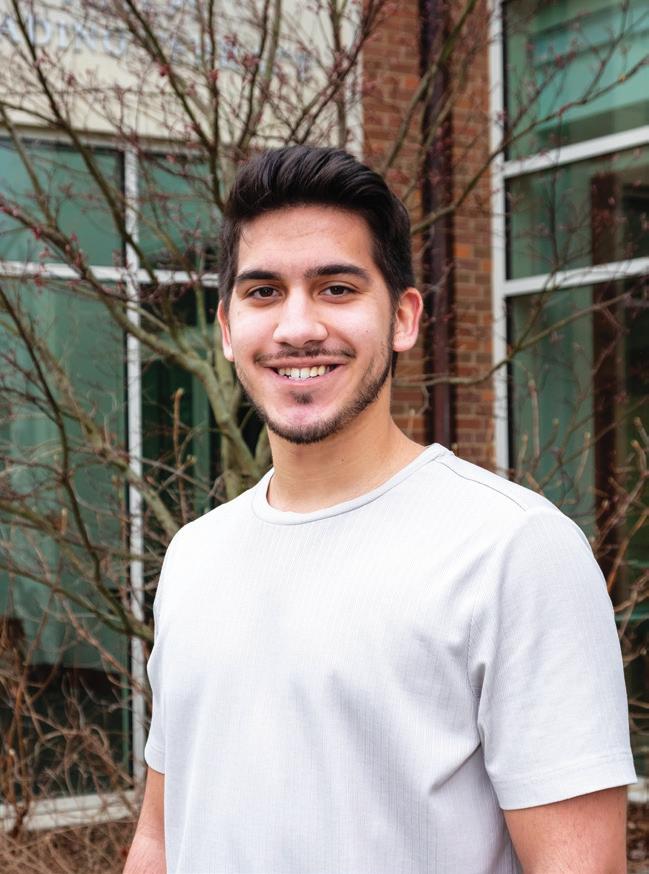
“Working with the Impact Center has been one of my most meaningful experiences at Muskingum. Director of Career Services Jackie Vascura has been especially helpful and encouraging to me as I explored my various interests. Last summer, I shadowed my older brother, Heema Khedr, who co-founded a residential real estate group in New York City, The Heard | Khedr Team at Compass. I discovered that I am passionate about the profession, and over this past winter break, I earned my New York state real estate license. After I graduate from Muskingum in December 2024, I will be moving to New York City and joining The Heard | Khedr Team full-time.
“I know that my Muskingum experiences would not be possible without support from alumni. I am grateful for the ways they give back to the University and help make this education happen.”
23
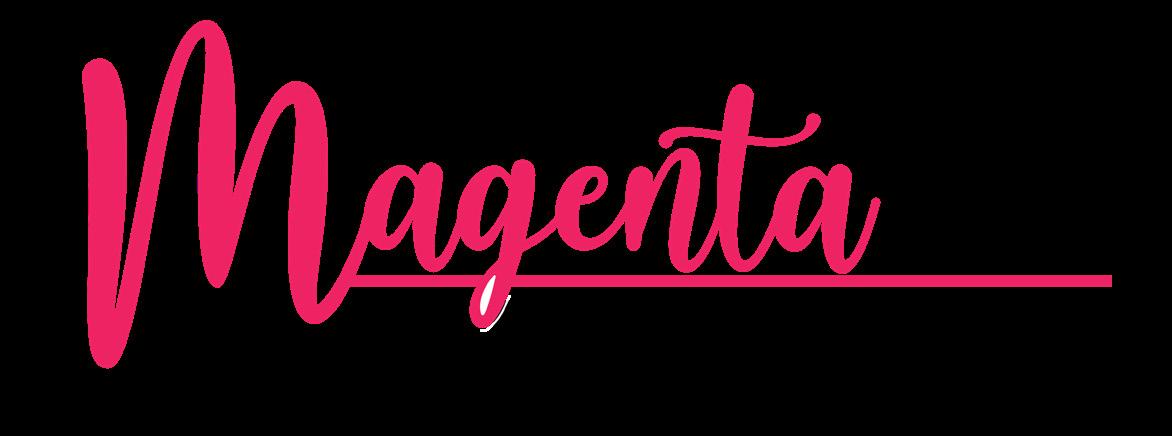
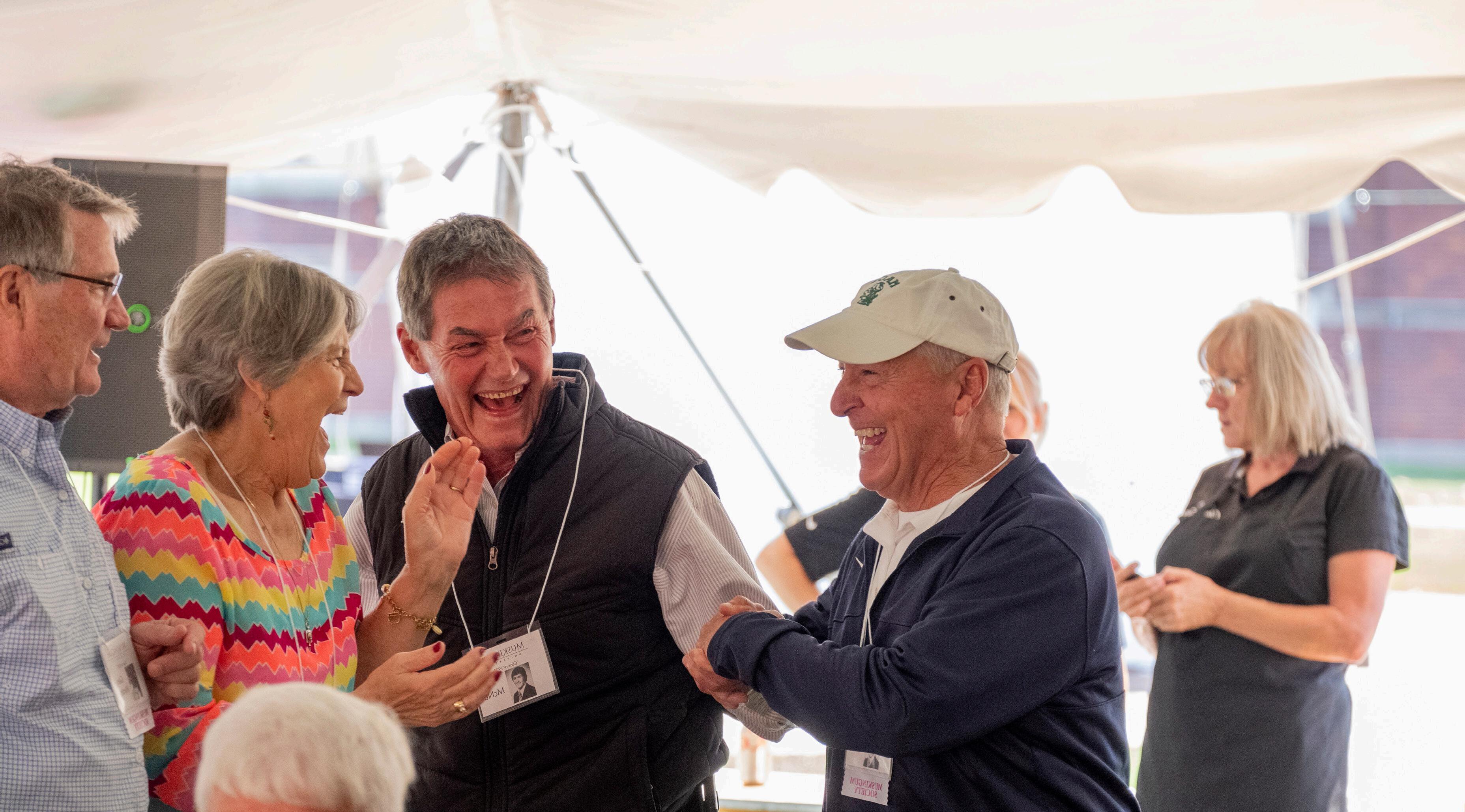
JOIN US FOR JOIN US FOR ALL MEMBERS OF THE MAGENTA LINE ARE WELCOME! We hope to see you there. OCTOBER 18-20, 2024











































